#14erChallenge
Explore tagged Tumblr posts
Text
Longs Peak by Visit Colorado... One day I'll hike this, my ultimate 14er

Dreaming of conquering Longs Peak, my ultimate 14er. One day, I'll make it happen.
0 notes
Photo

Another bucket list was marked off on the South Mount Elbert Trail yesterday. We woke up early and started hiking at dusk. The views along the way and sense of accomplishment is beyond words. . Going up is slow with MANY stops to let the heart rate and breathing slow down. Going down is faster but painful on the legs, knees and feet. It was amazing to see some young men carrying their mountain bikes to the summit and then taking a nice long downhill ride. . We discussed which peak to attempt with @ketch022 who has done several. He helped us decide on Elbert by saying "They all will hurt, so you might as well do the tallest in Colorado". . . . #bucketlist #mtelbert #mountelbert #twinlakes #hike #dayhike #summit #peak #challenge #hikecolorado #mountains #landscapes #greatoutdors #14erchallenge #14er #14ers #fourteener #rockymountains #rockies #explorecolorado (at Mt. Elbert - 14,440') https://www.instagram.com/p/CDCO1vsJtwO/?igshid=1391pkwboxt5q
#bucketlist#mtelbert#mountelbert#twinlakes#hike#dayhike#summit#peak#challenge#hikecolorado#mountains#landscapes#greatoutdors#14erchallenge#14er#14ers#fourteener#rockymountains#rockies#explorecolorado
0 notes
Text
#32 – Quandry Peak – 14,265

I had to be at work by noon today and I didn’t really feel like getting up at 2am this morning, so I chose a quick, easy, and close hike. Also it’s a Thursday and there’s snow on the peaks, so I was hoping to avoid hiking traffic.
I got up at 3:30am and made it to the Quandry Trailhead at 6am. There were noticeably more vehicles on the road this morning than when I usually drive to 14ers. Must have been because I wasn’t leaving quite as early.
The road to the trailhead is a short 2WD dirt road. I can’t imagine it ever gives people problems. There are two parking lots, a lower one (with 2 clean porta potties) that can hold about 50 cars, and an upper one that can hold 5-6.

I started at 6:15am. This is obviously a great snowshoeing trail, as it’s wide and has a lot of wooden trail signs pointing the way. I was able to see them, even in the dark.

The trail meandered through a forest and when I came to treeline the snow began on the trail and sun began to rise. I absolutely LOVE sunrises from 14ers, so I stopped to take a few pictures.


At this point I was at 12,800’ and microspikes were needed. Well, not needed necessarily, as technically you could just follow the ridge to the left and not need them, but what’s the fun in that? I put on my microspikes and climbed straight up that ridge, looking for cairns. This one was obvious, but after this I didn’t see any more.

Funny thing, that ridge didn’t seem to end! As soon as I’d reach the top of one, I’d see another. And they were all covered in snow. Luckily the snow was packed tightly, but it felt like I was hiking on my tip-toes.

I kept climbing and climbing and climbing, and eventually I just had one more ridge to go

youtube
It felt like it had taken FOREVER to climb that entire ridge, but I summited at 8am. The summit was flat but looked a bit rocky under all that snow.

I took a look around. The views were amazing! The entire high country is blanketed in snow!

youtube
I took a picture to prove I’d summited

And turned around. Now I got to hike back down that ridge! Hiking down is usually more difficult for me than hiking up because I train running uphill (so my muscles are used to it) and my center of gravity is off when hiking down hill. Also, my knees are at about 95% right now after those falls two weeks ago. I only notice it when I either touch my knees where they were injured or go down stairs/climb down mountainsides. Not to mention by now the sun had come up and the snow was now more icy/slippery.

That ridge seemed to go on forever on the way down as well! It was indeed quite slippery, and I was happy to practice maintaining my balance on the ice/snow. I appreciated when I sank into the snow about 2-3 inches, as it gave me traction. I never post-holed, but it was obvious others had and would later in the day.

Here’s a happy story: I rounded a corner, and saw a Mountain Goat!

I’ve hiked 14ers dozens of times and this is the first time I’ve ever seen a mountain goat while hiking! I know they’re popular on a lot of the trails, but I never seem to see them on those trails. Anyway, I named him Billy and he seemed to like me.

In fact, Billy followed me for about a quarter mile of the trail!
youtube
He was a slow hiker however, and soon I had to say goodbye.

This part of the trail gave me the views I’d missed hiking in the morning: views of a few 13ers: Wheeler Mountain, Drift Peak, and Fletcher Mountain.

All in all, this was a pretty easy hike. I made it back to the trailhead at 9:55am, which meant I’d hiked about 7 miles with 3500’ in gain elevation in less than 3.5 hours, and that included time to take a lot of sunrise/goat pictures, and to hike alongside a mountain goat for quite a while.
I’ll probably be back to do this one with more winter conditions (and friends) later this season! I need an excuse to try out my new snoeshoes…
Oh, and I made it to work at 11:58am. I hadn’t made it home to take a shower first, but that’s ok because I was the only one there and just needed to be there for a WebEx call. I put on a new shirt, did my hair, and was good to go!
#wildwanderer#summit#14er#14erchallenge#14erchallenge32#quandrypeak#14265#mountaingoat#billie#hiking#colorado
5 notes
·
View notes
Text
2017 Lessons Learned

Well, I guess the seasons over. I hiked 35 unique 14ers and 2 13ers since June of this year, bringing my total 14er count to 47 (including repeats). I also made several failed attempts of 14ers and successful summits of peaks at 8K, 9K, 10K, and 11K not included in these numbers.
When I started this endeavor last June I had a goal of hiking eleven 14ers this year. I more than tripled that goal. Not because I intended to, but because it became really fun: mountaineering became a passion, a lifestyle, and very, very addicting.
Most trails took 3-5 hours to drive to, approximately 10 hours to conquer, and 3-5 hours to drive back. That’s a lot of solo time to think: I loved every minute of it!
I’ve learned a lot too. So much I could easily write a book. Obviously I’m not done learning: Mountaineering is full of continuous learning, improvement, and reevaluating.
I wouldn’t be exaggerating to tell you my whole world view has changed this summer. We all hear or read certain words and immediately a picture comes to mind of what that word means. We have an association with that word. For example, what do you see in your mind when you hear the word gully, traverse, junction, self arrest, spur, couloir, glissade, basin, post hole, head wall, saddle, pitch, scramble, ridge, cornice, crevasse, chute, narrow, soft, hard, rock wall, scree, river crossing, switchbacks, talus, summer storm, exposure, approach, cairn, chimney, timberline, gain the summit or take the ridge?
Previous to this 14er endeavor I had visions in my head to fill all these words and phrases, but in this past climbing season these visions have changed. Drastically. They’ve come to life and taken on a world of their own. Now when I see the word ‘basin’ in my head it’s not a drawing on a map, but a full scale area of drainage and rolling hills spanning multiple football fields in length, covered in tundra and alpine flowers. A ‘gully’ is a 4 letter word (more on that later) and ‘exposure’ is something dangerous that could include drastic changes in weather or falling to my death. When I hear the phrase ‘take the ridge’ I see a long narrow mountaintop with steep drops on either side I’m supposed to navigate around towers or rock to get to the summit I wish to climb. I can envision in my mind vividly what each of these words means as an experience, and these experiences have changed me.
As I said earlier, I’ll continue to learn, and I’ve learned more than I could ever put into words here, but I’ll give you some of the highlights in no particular order:
Climbing is not the same as Hiking. There is a huge difference between hiking and climbing (and between different types of climbing). All 14ers include a hike, but not all include a climb. I’d say most climbs begin with Difficult Class 2 and include Class 3 and above. A climb requires putting away the camera and using all four appendages to scale a mountain. There were times this caught me off guard, even with proper planning. In essence, climbing is mountaineering, and hiking is just that (hiking).
Hiking /Climbing /Mountaineering takes planning: Successful summits don’t just happen. Driving directions, routes, GPS coordinates, weather, dates, time, ability, etc. all need to be taken care of before the hike actually takes place. Of course, you can just try to do all this on the fly, but I can guarantee you something will go wrong. Things go wrong with even the best of plans, but when you plan you give yourself a bigger degree of success.
When you plug in the coordinates into your GPS and it brings you 200 feet but 10 driving miles away from the trailhead where you no longer have access to cellular data and the GPS keeps unsuccessfully trying to reroute but you HAVE NO DATA and you arrive in the dark it can be daunting, but if you have a printed map available that can get you where you’re supposed to go you’ll appreciate your planning. This happened to me so many times this summer I’ve lost count.
In addition, there were several times I found out hours before a hike my booked schedule was now free and I was able to go. If I hadn’t already pre-planned routes, driving directions, etc. I would have missed out on a hike because they take a while to plan. Several times weather derailed my plans at the last minute. Because I’d put together dozens of potential trips I just switched to an area with more favorable weather. Mountaineering takes planning. Plan.
Hike when you can (see above). It’s not always easy to get up at 2am and drive 4 hours to a trailhead, but I’ve never regretted a hike. If I slept in on all the days I wanted to instead of hiking I would have missed dozens of amazing experiences, all for sleep. You can tell people about your dreams or your accomplishments. As far as I’m concerned, sleep when the weather is bad, hike when you can.
Difficult Class 2 means gully. I hate gullies. I used to think a gully was a beautiful canyon full of lush landscape, trees, waterfalls, and streams (hello, Fern Gully?) but they’re not. Gullies are alleys eroded by water and snow. They’re usually narrow and steep, formed by loose rock and sand, extremely difficult to find traction on to climb, and the only route up the mountain due to steep rocks on all sides.
The more challenging ones encompass an entire mountainside. They are difficult to climb up, but even more difficult to climb down, as your center of gravity is off and slipping and sliding hundreds of yards to your death or grave bodily injury is a serious possibility. In my opinion, gullies are more dangerous and difficult to climb than a Class 3, and a route that includes a gully is one I try to avoid if at all possible. Wear a helmet and microspikes whether or not there’s snow/ice.
Listen to others. Ask for advice from others who’ve summited a mountain you’ve yet to summit. I’ve never understood why some people just don’t want to take advice? Everyone has something you can learn from. As far as I’m concerned, I want to be as prepared as possible when out there dozens or hundreds of miles from civilization (read: help is far away). It’s great to know if there’s a false summit or difficult area that has a trick to get around. Ask hikers hiking down the mountain while you’re hiking up about conditions (etc.) and truly listen to their responses. I can’t tell you how many times I’ve been hiking down a mountain due to weather and tried to warn people hiking up. No one has ever taken my advice, and I know for a fact several of them ended up getting caught in hailstorms above treeline.
Everyone has different comfort levels / risk tolerances. Know yours. When getting advice from others keep this in mind. Challenge yourself, but don’t be stupid. I’ve taken several routes I know I wouldn’t have completed if I’d been with others because I have a higher risk tolerance than most people. We would have turned back and I wouldn’t have summited. I’ve also taken alternate routes when the one in front of me was too difficult. The bottom line is if you don’t feel comfortable don’t do it just because someone else has.
Climbing time and pace don’t correlate to distance. Just because you can hike 20 miles in a day near your home doesn’t mean you can hike a 20 mile 14er in the same amount of time. A general rule of thumb for hiking is 2mph, but this varies widely depending on ability, experience, weather, carrying weight, and terrain. Just because you hiked a 7 mile class 1 14er in 3 hours does not mean you can hike a 7 mile class 2 14er in 3 hours. Look at elevation gain and difficulty of terrain before setting out, and remember climbing takes longer than hiking. Think about it: Can you climb up a mile worth of rocks in the same amount of time it would take you to walk the same distance? Probably not. This corresponds with 14ers too, and learning your speed comes with experience.
Keep your pack packed. This also goes hand in hand with planning. If you never unpack your gear you’ll never need to re-pack it. I always keep my microspikes, sunscreen, gloves, hat, compass, emergency first aid kit, matches, whistle, etc. in my hiking pack. When I get back from a hike I refill my water bladder and replace my bandana (and wash the old one). I never need to wonder where my gear is or if I have it because I always keep it in my pack. This saves me the time and hassle of prepping the night before, and wondering where stuff is.
Have the proper gear. This is very important. You shouldn’t just head out on a hike up a 14er with just tennis shoes and a water bottle (although trust me, I’ve seen many people do just this). Know what the 10 essentials are and bring them. Use a water bladder instead of a water bottle. Get a good pair of hiking boots, trekking poles, a helmet, microspikes, and all weather jacket. It’s amazing what a difference good shoes and microspikes can make on a trail with just a little bit of snow/ice. If the weather/terrain calls for it, invest in crampons, climbing gloves, and an ice axe (and learn how to use them properly before needing them). It’s extremely frustrating to hike in 10 miles and have less than 1 mile left to the summit, only to have to turn back because you don’t have crampons and you can’t hike any further without them.
Learn to layer. The weather on the mountains is unpredictable and changes quickly. I’ve never regretted bringing my snow jacket on every hike I’ve been on, even in the summer. And in case this is new to you, NO COTTON! (this means no jeans, cotton socks, cotton t-shirts, cotton gloves, etc.). In case you’re unsure of how to layer, here’s a photo:

Learn how to eat. I don’t get hungry on the trail as a rule, but every so often the hike takes longer than anticipated and I’m glad I pack food no matter what. While on the trail don’t go for foods that are overly ‘healthy’. During the hike is when you need protein/calories to keep going! Lightweight foods that are high in calories work best. I like to make homemade beef jerky and bring that with me as a snack, along with some dehydrated bananas and peanuts. When hiking long distances remember the weight to calorie ratio: I’d rather bring along and eat two Reese’s Peanut Butter cups than an apple (even though it’s “healthier” the apple weighs a lot and doesn’t give you the calories you need to keep you going).
Hike Early. We’ve all heard to hike early to avoid summer storms, but there are realistically many more reasons to do so than just the stormy and unpredictable summer weather.
You’re generally more rested earlier in the day
In the summer while it’s cold in the morning you’ll warm up fast once you start hiking and it won’t be quite so hot above treeline if you get there earlier in the day.
If something goes wrong you’ll have more time in the daylight to problem solve
You avoid the crowds and actually get a spot at the trailhead to park your vehicle
Colorado sunrises are amazing. Be where you can appreciate them (above or as close to treeline as possible)
If you finish early you’ll have time to celebrate by resting your feet in a stream or head to town for a beer
Making it up is optional, making it down is mandatory. We’ve all heard this phrase dozens of times, but it’s much more difficult to implement than to say. Nothing hurts more than turning back on a summit, but know your abilities, and make a plan before you ever get into that place where you need to make the decision to turn back. This includes time limits (I need to be at my halfway point by x time to summit today) and weather restrictions (if I hear thunder I’m turning back versus if I hear thunder 3 miles away I’m turning back versus if I’m above/below treeline and hear thunder I’m turning back, etc.). If the terrain is above your abilities or you don’t feel comfortable, know to turn back. The mountain will be there tomorrow, next week, and next year. Make sure you’re there to see it.
Easy and close to Denver means crowded. Think Mt Evans, Mt Bierdstadt, Quandry Peak, etc. If it’s a class 1 or 2 and less than 8 miles of hiking distance expect to hike with dozens (if not hundreds) of your favorite hiking buddies no matter what day of the year it is. This means limited parking at the trailhead, crowds, fewer animal sightings, blaring music from someone hiking with speakers, hikers that smell like marijuana, seeing people peeing above treeline and summit photos with people you don’t know in the background. Sometimes the drive away from town is worth it.
The mountain is bigger than it looks, and smaller too. Study your maps and do your research and things will still surprise you. The mountain looks different from far away than it does up close. Sometimes the challenges are bigger than they appear, but often smaller as well. There have been several places that from afar looked impassable, but once I was closer I could see a navigable path. Take the trek one step at a time, and don’t give up or make up your mind until you get there.
If you don’t try you’ll never know. I got this advice from my 14 year old while going back and forth over whether or not to hike on a particular day when all my information was giving me a 50/50 chance of summiting. When in doubt, go. You can always turn back if you need to, but you’ll wonder forever if you never try.
Weather forecasts are wrong, but check them anyway. I can’t tell you the number of times I’ve checked and checked and checked the forecast for a particular area only to have it completely different once there. Sometimes this worked out in my favor (anticipated 30+mph winds that never materialized) but often it didn’t (the only cloud in the sky was directly above the peak I intended to hike, and it was filled with ice and wind). On the other hand, it’s nice to know when it’s expected to thunder and lightning all day or if the wind speeds are anticipated to be above 50mph. Knowing there’s a 50% chance of hail at noon helps you to make an informed decision about whether or not to continue your hike when you see clouds forming overhead, or even in determining which hike you should take that day.
If there’s water, there’s ice. Especially when it’s dark, just assume everything wet is really ice and can cause you to slip and fall. Proceed with caution.
Ladies: Never let anyone tell you a tampon is unnecessary weight. Never, ever ever. Altitude does weird things to your body, and those around you as well. You might not need it, but you’d be surprised how often you might just meet someone along the trail who does and make a friend. They don’t weigh enough to outweigh the benefits of having one with you, and they can double as emergency first aid supplies (a quick google search can answer any questions).
Carry a bandana (or two). Seriously, these are lifesavers! There are hundreds of ways to use a bandana, not to mention for blowing your nose, for use instead of toilet paper (this is why I said two), or to immobilize an injured appendage. Ladies, also see note above and infer.
Ladies, learn how to pee above treeline. For guys this is a no-brainer, but for women it can become an issue, as many hikes continue for miles above treeline and if you’re drinking water you’ll need to pee (and there’s no place to hide). Here’s a hint: Find a place to sit and use your jacket to cover your lap. Problem solved!
Learn how to blow your nose without a tissue/bandana/etc. It’s gross, but along with a trusty chapstik will save your nose/upper lip from getting raw (basically you just plug one nostril with your thumb and blow really hard). Also, don’t do this in the company of others (once again, it’s gross).
Bring along a GPS and a topo map: And know how to use them! Social trails abound in popular areas and the real trail can get muddied. A GPS is no good if you don’t know how to use one, and a topo map and compass are as well. Practice before you need them on easier hikes closer to home. They can both really save you if you get lost/stuck on the trail.
Don’t expect an engraved invitation. What this basically means is don’t expect a trailhead sign to indicate where the trail starts, or even signs along the way indicating which direction to take at a junction. While there are many trailheads with amazing signs indicating you’re at the right trailhead and where the trail begins, this is often not the case for 14ers. Several times I’ve parked (in the dark) at the end of the route and supposed beginning of the trailhead, not able to see where the trail actually begins, or even a sign indicating I’m at a trailhead. Often times you’ll come to an area where several trails intersect and there’s no signage. This is where having a GPS comes in handy.
Don’t expect a trail. Unless you’re hiking a class 1, there won’t be a trail to the summit. There will be some route finding involved as well as hiking over rocks (etc.) with no established trail. I’m not sure why this was a surprise to me, but it was in the beginning. For some reason I thought I was owed a trail while hiking, but 14ers are a different game and considered difficult and a challenge for a reason. Learn to use a map and compass and develop some route finding skills.
Sometimes the obvious route is the actual route. One time I was hiking and met several people along the way. We all knew the cutoff for the peak was difficult to find, and somewhere in-between two points. I happened to see a cairn wrapped in pink electric tape, and suggested that was the route to take. Everyone else agreed that was too obvious, and probably there to indicate the mine behind it. Nope, the pink tape indicated the correct trail. GPS was helpful here as well.
Just because they’re close to each other doesn’t mean they’re the same. Each 14er is unique, and just because two 14ers are a couple of miles apart or in the same range or ‘connected’ doesn’t mean their routes are similar. Sure, the views, animals, flowers, and stability of ground will be similar, but look at their class rankings: A 2 class can be very different from a class 3, even in the same range.
Buy a 4WD vehicle with clearance. Extra points if you can sleep in the back. If you’re serious about hiking all 14ers you’re going to need a 4WD with clearance; either that or you’ll need to love hiking an extra 15 miles to get to the trailhead. Many trailheads to 14ers are at the end of serious 4WD roads. If you can’t afford to buy one make friends with someone who has one, or rent one for the weekend.
13er doesn’t mean easier. Think about it, a 13er could be one foot shy from being a 14er and is still referred to as a 13er (13,999). They’re just as difficult, and often more so because they don’t have established trails and aren’t as frequented by other hikers. Don’t judge.
The way the mountain is facing is important for snow/ice reasons. Routes facing the west and south clear of snow and ice much faster than routes facing the east and north due to length of exposure to sun and ability to melt snow and ice. Do your research, know which way your route is facing, and plan appropriately. I’ve hiked mountains where one side of the mountain was completely clear of snow (the side you could see from the road), and as soon as I got to the inside hiking area it was like a snow globe.
Weather changes class. A class 1 hike can easily become a class 2 climb or above in snow. Wind, snow, ice, etc. can drastically change the difficulty of the climb. Know your abilities and be prepared.
Don’t hike to get in shape. Get in shape to hike. The hike will be a lot more enjoyable if you’re physically up to the challenge. Breathing above treeline is a lot different than breathing below it. When you go above treeline, it’s like you can suddenly feel that the air is thinner. You get tired quicker and it’s harder to breathe as well as you do in lower altitude. Being physically fit makes this transition easier. Use the winter months to work out and build up your endurance. You’ll thank yourself for this later.
It hurts just as much not to hike as to hike. Sometimes you need to make the call not to hike, and that has to be ok. Personally, right now, I’m itching to go hiking this weekend, but the weather isn’t cooperating and I’ve already made other plans. I’m a nervous ball of energy that’s struggling to find an outlet, so I’m going to use this weekend to catch up on sleep, and to plan future hikes. Be prepared for times when hiking isn’t possible, and ways to be ‘ok’ with it.
Every hike/peak/summit has a story: Yours. After a while they’ll all run together and you’ll forget things. Write them down as soon as possible after your hike. Take pictures. Talk about your experiences and share your stories. If you don’t, you’ll wish you did…
1 note
·
View note
Text
Willow Lake

This week has been challenging 14er wise. I’m working from home all week, so basically I could’ve hiked any day I wished. I’d planned on hiking Monday, but we had a big storm roll in and blanket all of Colorado with snow. That meant I couldn’t hike Tuesday either. I made an awesome choice and hiked Uncompaghre Wednesday. I was quite pleased with myself, and wanted a similar success today. Most of the peaks I still have left to hike were too snow covered to hike this week, so I went online last night and tried once again to get information on the Crestones. The webcams made it look like they were pretty devoid of snow, but I wanted to make sure before heading out there. The forecast said it would be clear, with temperatures in the 50s with 25mph winds. The winds were higher than I’d have liked, but in the past the wind speeds have been overrated, so I didn’t pay much attention to them.
I checked my schedule for today and cleared it a bit (my son would pick up my daughter from school) and tried to get to be early. That didn’t work, but I did manage to get in 3 hours of sleep before waking up at 1am to head to the trail.
This is where my bad luck began. I’d copied and pasted the GPS coordinates into my phone, and when they pulled up they looked like what I’d printed out from my research: same mileage, cities, highways, etc. So I just followed the directions on my phone and arrived at what I’d thought was the trailhead. It was kind of weird I’d gone through a residential area, but it was on an unpaved road and we were backing up to the forest, so I figured this was the trailhead. But when I started on the “trail” (no sign, which is a pet peeve of mine) I realized I was at a water treatment plant? I pulled out my GPS and I was right where I was supposed to be, but when I zoomed in I realized I was about 15 yards off from the exact trailhead, and since I was in the middle of nowhere it would take me 20 miles to go around on the roads and park in the proper spot. I briefly considered just hiking towards the trailhead but thought better of it and drove around. The lady who’s house I’d parked in front of would appreciate I’d moved my truck from her front lawn.
This meant I’d arrived at the trailhead 30 minutes later than my intended time. I was already cutting it close (I know, I know, it’s a bad idea to put time limits on hikes, but I’m a single mom and have a lot of other responsibilities too: If I’m going to hike I have to accept these time restrictions, summit or no). 30 minutes can equal 2 miles if I book it. I seriously hoped I didn’t just endanger my ability to summit because of this stupid mistake.
The drive in was 2WD all the way.

And there was ample parking at the trailhead

Woohoo! A trail sign! I LOVE these things! This meant I was on the right trail.

I grabbed my stuff and was off at 5:30am. Right away I had difficulty. The trail obviously went to the right, but there were several social trails.

And it was dark. GPS is great, but it’s off a few feet in every direction, and I couldn’t really tell which way to go. There was a stream to the right, and I figured that was where I was supposed to go, but there didn’t seem to be a way to cross it?

In the dark (even with a great flashlight) I couldn’t see across the stream, and it didn’t look like the trees made a bridge across. I spent another 5 minutes looking at my GPS and going in circles before taking the plunge and just walking across the stream, not knowing how deep it was. My feet and legs were wet because the water was about a foot and a half deep, but there was an obvious trail when I made it to the other side.
Woot! I was on my way! The first 4.5 miles was switchbacks. Lots and lots of switchbacks. I didn’t mind much, because I was working out the elevation gain in my head and this was an easy way to get in those 4.75 miles to Willow Lake.

I crossed several smaller streams in the dark and saw numerous waterfalls. I’d be getting pictures of them later! (here they are)

Side note: water at this altitude/temperature means ice. If it looks wet, assume it’s slippery and unstable. I know this from experience.

Especially on those log “bridges”.


The last quarter mile before the lake was where the trail got rough. Well, not rough, but messy. Lots of ice and snow and mud on the trail. Yuck!


The view was great though! The only downside from this route was I wouldn’t be seeing a sunrise (it was on the other side of the mountain). It looked like I’d picked a great peak to climb today. There was minimal snow when compared with other 14ers and no clouds!

Just before reaching the lake I was watching my feet as I was hiking (ice, remember?) and I saw what looked like toes in the mud. I briefly thought it was a print from someone wearing those shoes with the individual toes, but quickly realized it was a (small) bear print! Woot! Awesome! That meant there was a bear in the area! It looked bigger than a cub print, but not big enough to be a full grown bear, and the prints were heading away from me (back where I’d came from) so we’d missed each other. Oh well, maybe I’d see it on the way down?

I pressed onward, over what looked like it was a waterfall at various points during the winter

And arrived at the lake!
It was now 7:40am. I’d hiked 4.75 miles in 2 hours 20 minutes. Uphill. Immediately the weather changed. The wind picked up dramatically, and there was no sun? The temperature dropped as I looked for the correct trail. I knew it went left behind the waterfall on the other side of the lake.

My GPS told me to go one way, but that way was now “closed for restoration” so I did my best to look for the proper trail. No dice. I ended up kind of bushwhacking my way through some willows (there had been a trail there previously that was not too overgrown) and up some rocks to where I saw a sign indicating the trail. I checked my GPS: success!
I kept trudging, admiring the view

As soon as I made my way over the waterfall area I got a good look at the Crestones: This view offered a stark contrast to their backsides! I was amazed at how much snow there was here in the middle compared to the east! No worries though, snow was easy enough to navigate.

I crossed a few very slippery half-frozen streams and made it to a large basin.

The wind was howling at this point. I looked up at the intended route and sighed inwardly: a gully. A BIG gully. I hate gullies! The first part didn’t look too bad though, and it looked like the sun was coming out?

Nope, it went right back behind the only cloud in the sky: the one very similar to the one I’d encountered on Blanca Peak last month. UGH! The weather was supposed to be sunny, clear, warm, and windy? When will I learn 14ers create their own weather? It WAS sunny, clear, warm, and windy everywhere except in the basin I was in.
Here is was cloudy, cold, and very, very windy. I rounded some large boulders and looked at the hike in front of me. Lots of snow covered the trail, with no footprints. I was probably the first to take this route since before Monday’s storm. No worries though, I liked hiking in the snow. I put on my microspikes and headed in.

I made my way to the gully. It’s actually much bigger than this picture indicates. I looked at my watch. I had exactly 2 hours to summit both peaks. In normal conditions, even with a little snow, this was doable. Today however was another story. I decided to start climbing and see how far I could make it, then adjust my goals.

The gully sucked. There wasn’t enough snow to make it easy to climb, but there was a lot of ice. And wind. Lots and lots of wind. Bitter, cold, snow-filled wind. I picked a ledge and followed it, which was much easier than hiking up the scree/snow. I gained the first ridge and looked at the rest of the route. It went to the right of the gully. Right where the wind was swirling snow into the air.

The weather kept getting worse.

The wind picked up and knocked me into the side of the mountain, hard. It pressed and held me there as ice crystals swirled up and around me and gave me an unwanted dermabrasion on the only exposed surface of my body: my face. I stood back up and got my bearings, but another gust of wind did the same thing all over again. This was not going well. I got out my map, and looked at the ‘easy’ ridge I’d get to summit after making it up the side of the gully. Ugh! It was covered in snow! (and most likely ice) And that wind! Down here it had to be at least 65+MPH. Up there? Probably worse. I did some mental calculations, and figured it wasn’t safe for me to try to cross that snow/ice covered ridge in this wind. It was knocking me around like a doll down here: I didn’t stand a chance on the exposed ridge. Maybe I could wait the weather out and see if the sun re-emerged and the wind died down? It was early yet, but how long would that take? Even now I wasn’t sure I’d be able to summit one, let alone both of the peaks I’d wanted before I had to turn back around to make it home on time, help from the sun or not. How far could I make it if the sun was out? Was it worth the wait?
Take a look at this video. See where that snow is circling to the right of the snow filled gully? That’s the route I needed to take, and then across the ridge to the left.
youtube
Then I really got to thinking. If I wasn’t going to summit today, what was I doing mentally calculating how much further I could go? Here I was, cold, on top of a gully, halfway up the side of a huge mountain, trying to gauge how much farther up I could safely climb, when I had no intention anymore of summiting. The wind was knocking me around, the ice was terrible, and my fingers were numb. The climb up the gully had been difficult and slow, and I knew from experience the hike down would be worse (center of gravity problems mixed with ice means slow going and causes slips and falls). And here I was, mentally calculating how much further I could go before I absolutely must turn back because of TIME. To make it to a class I was teaching on outdoor survival skills. Wouldn’t it be ironic if the reason I didn’t make it to the meeting was because I needed to be rescued?
Good point. I turned around and headed back. Summiting was optional, but making it down was mandatory. The gully down was indeed worse than the way up, and took me twice as long. By the time I’d made it to the bottom my fingers were turning white and I couldn’t feel them anymore (they kept gripping snow for traction, and I don’t do well in the cold). The look back was beautiful though!
I re-crossed over the waterfall and looked at Willow Lake from above

I probably should have noted the ice hanging from the waterfalls earlier. It was cold here, and had been for a few days.

There were tons of waterfalls on the way down, and lots of mud/ice to trudge through. No sign of that bear though.
Oh, but the birds were ‘singing’
youtube
What really hurt was turning back and looking on the mountain I hadn’t climbed. It looked warm and inviting on this side, yet I knew once I rounded the back it was a bitterly cold snow-globe of ice, wind, and snow. What’s worse is turning back today meant I might not get to hike another 14er this year: I don’t have many more available days so this might be it. I took a good look at all the mountain ranges on my way in. They’re socked with snow, and all are getting wind this weekend. Snow I can handle, but this kind of wind? Not fun.

It ended up being an 11 mile hike, I’m not sure about the elevation gain, but 3500’+
I’ve hiked 43 14ers and this is the first time I’ve had to turn back due to weather. And what’s worse, it was due to the wind, not snow, rain, lightning, etc. Oh well, the mountain will still be there next year. I’ll try again!

5 notes
·
View notes
Text
#31 Uncompaghre - 14,309

Notes:
· The trailhead is 4WD
· The trail was pretty much free from snow, even after Monday’s storm. Microspikes were not needed.
· This would be a great first class 2 hike: it’s easy to follow, relatively short, and not too taxing
· If you’re looking to spend the night on a 14er summit, this would be a good choice
Uncompaghre, or “Uncle Padre” as it’s affectionately referred to, wasn’t supposed to be my hike today. We had a storm come in on Monday, blanketing the entire state with snow. So I’d gone on the Colorado Webcams page to see what the conditions looked like in different areas of the state (if you don’t know about this site, take a look: http://www.keno.org/colorado_web_cams/colorado_cams.htm )
I was specifically looking at peaks in the Crestone area, and the webcam made it look like there was surprisingly little snow. I was thrilled! That is, until night fell and I looked at the web cam again, and it still showed daylight. It was then I went on the forum and someone said there was a lot of snow on the Crestones, and I concluded the webcam must have been broken. It was showing the correct time/date, but the image was obviously wrong. UGH!
No worries though, I had about 5 different 14ers I was interested in, so I just went down my list. I wasn’t 100% sure the conditions weren’t great at the Crestones (I asked for clarification from the poster and never got any), but the webcams for Lake City looked promising. I gave it some thought and did a pro-con list. The Crestones were closer, the hike was longer, and I’d get 2 14ers in tomorrow, but I didn’t know for certain the conditions. Uncompaghre was a lot further (6 hours), the hike was shorter, and I’d only get in one peak (I really wanted to hike it with Wetterhorn). But my knees still weren’t 100% from my falls last week (I’d say 80% on one knee, 85% on the other) so a shorter hike was probably a good idea. Also, Uncompaghre is affectionately referred to as “Uncle Padre”, and it’s my Uncle’s birthday today, who pretty much was like a father to me growing up, so I saw it a sign of good luck and just went for it. Uncompaghre it was!
I woke up at midnight and made it to the trailhead at 6am (remember, I don’t sleep well at trailheads, so it’s just easier for me to drive and hike). There’s an obvious sign telling you where the trailhead is. If you don’t have 4WD, park here.

The drive up is definitely 4WD. My directions indicated I’d cross 2 streams, but I crossed 3, and was delighted to do so! My whole face lit up when I saw the first one: I love it when I get to drive my Tundra through streams!
youtube
The only downside to this road is it’s pretty narrow, and a bit bumpy in places. There were 3 turns that were tight for my Tundra, and I had to back up and reposition my truck to make the turns happen.

There was also a lot of ice on the trail (which I’m assuming is gone now). In fact, there was a lot of snow on the entire drive up, starting at about 8000’. This seriously worried me for the hike ahead! I had microspikes and snowshoes, but would rather not carry them if not needed.
The trailhead had parking for about 10 vehicles and was pretty open.

The weather forecast for the area today was a low of 22 and a high of 44, but as I drove I saw the temperature drop to 19 degrees, and stay there. Lovely. There was a half moon, and I could see there wasn’t enough snow on the mountains for snowshoes (woot!), but I brought along my microspikes anyway. I bundled up and began my hike at 6:15am. There were two Park Service trucks at the trailhead, but I never saw people on the trail. The trucks were still there when I left.
The beginning of the trail had a bit of ice in the creek areas

I hiked through a basin, and about a mile in there was a little bit of snow on the trail, but it was easily avoidable, and this was seriously the most snow I saw on the entire hike.

As I came to the trail junction for Matterhorn Creek and Uncompaghre Peak the sun and the temperature began to rise. This is why I’d woken up at midnight! The sunrise was amazing!


I turned around to take a look at Uncompaghre. Wow.

The entire trail was well maintained and very easy to follow. It was almost too easy, it didn’t seem as if I were hiking a 14er.

The Alpine glow this morning was fabulous against the blue sky! I hiked up some switchbacks to Uncompaghre’s south ridge.

This ridge gave me amazing views! I had fun taking pictures

At the top of the ridge I turned left and went behind the mountain

I followed the trail and looked for this rock tower.

You can either go to the left of it or the right of it. I chose the right

The hike up until this point was very much a class 1 hike. However, at this point there’s about 30 vertical feet of hand and feet climbing. Woot! My favorite! I took a picture and put away my camera. Here’s why this is considered a class 2:

This is what it looked like from the top

The rest of the hike was pretty straightforward. I just followed a trail to the summit.

The summit was a wide, flat, barren summit. If you were looking for a 14er to camp out on for the night, this would be it (if you don’t mind wind). I summited at 8am.

I turned to look around, and all around me there was snow! I’d picked the only peak in the area without snow! Amazing!

I took a summit photo to prove I’d summited

And as I looked over the edge, I saw there was snow on the north face of the mountain. What a drop!

I didn’t spend long on the summit, but turned around and started back down. As I was descending the class 2 part of this hike I stopped to take in the view.

I thought to myself how this was the perfect hike for today! I didn’t get in Wetterhorn, but there are several 13ers in the area I can partner with Wetterhorn and take my time on instead of rushing to get them all in. I was glad I’d chosen to hike Uncompaghre solo for today.
I didn’t see anyone else on the hike until I was just about to exit the basin. It was a couple hiking together. I didn’t see anyone else the entire day, and luckily didn’t pass anyone on the drive down.
I made it back to the trailhead at 9:55am, so I hiked 7.5 miles in less than 4 hours, with 3000’ feet of elevation gain.
3 notes
·
View notes
Text
#33 – Wetterhorn Peak 14,015 and Matterhorn Peak 13,590
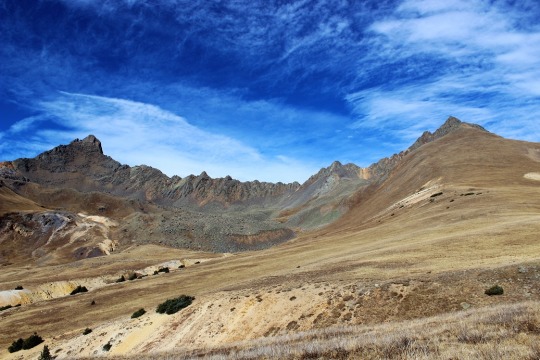
The weather today for just about every 14er in Colorado was the same: Windy. I’m not a fan of wind gusts of 45+ mph (which usually end up being around 85mph up on the peaks if we’re honest) but they’re manageable if it’s a warm day. I ruled out any peak with snow on it because wind and snow don’t mix (as I learned last week). That left me with Wetterhorn Peak for today’s 14er. I checked the weather: 20% chance of snow and 100% chance of 25mph+ winds with gusts of 43mph. Hmmmm. That didn’t sound too promising. Not bad, but not great. I knew there wasn’t any snow on Wetterhorn, so that was a plus. I was just worried it would get snow during the night/day and ruin the trip. I didn’t want to drive 6 hours out there to turn around.
I was musing all this to my kids when my youngest said “Mom, you should just go. You’ll never really know the weather or if you can make it or not unless you try.” She’s a smart 14 year old. (She must have an amazing mom…). I told her she was right, and set my alarm for midnight. Besides, this would be my 33rd 14er and my 3rd class 3. Lots of 3’s mean it’s meant to be, right?
The trailhead is easy to find/follow. From this sign it’s really a 4WD road.
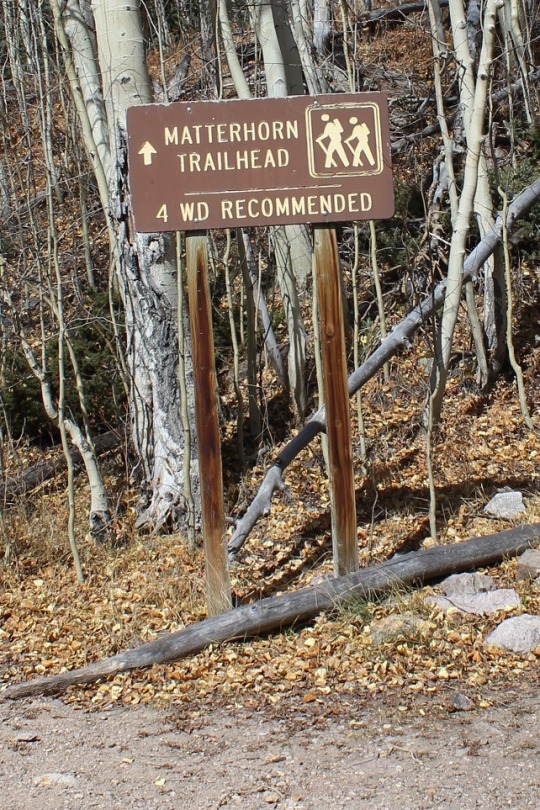
I know others have posted it’s manageable in a 2WD, and I’m sure it is for those amazing 2WD gods out there, but if you value your 2WD vehicle, do NOT take it on this road. However, if you’re looking for a reason to get a new vehicle, by all means proceed. Here are a few pics:
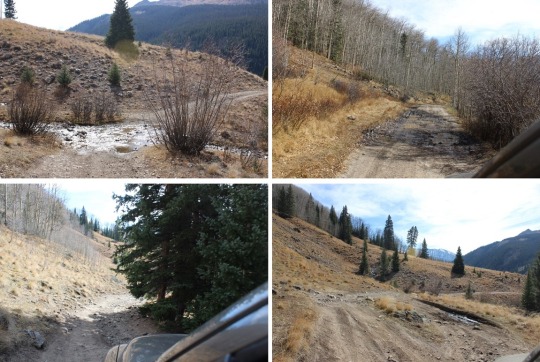
I made it to the trailhead at 5:30am and was on the trail by 5:45 (I drive fast). There were 2 other vehicles in the lot (I parked lower down). There’s probably room for 15 vehicles total at the upper trailhead, including parking about 10 yards below the lot. Here’s what the trailhead looks like in the daytime. The trail starts to the left of the trail signs.

Note: Most of these pictures were taken on the way down because my fingers were too frozen to take pictures on the way up.
The beginning of the hike was pretty uneventful. (Another Note: The summit ledger is full and the pen provided doesn’t have any ink left. Maybe a hiker could bring new supplies with them?) It was just me hiking in the dark. The trail was wide, clear of snow, with just a few muddy spots in areas. It was about 37 degrees, and there wasn’t any wind. Yet.
As soon as I hit treeline the wind began to blow, but it wasn’t too powerful and it wasn’t cold outside, so it was bearable. As the sun began to rise I noticed what looked suspiciously like snow clouds on the mountains next to where I was hiking. Luckily the wind was blowing them away from me. It seemed like the sun took an awful long time to rise this morning. I passed a boulder field that was easy to navigate but didn’t have any cairns? This could be a problem in the winter.
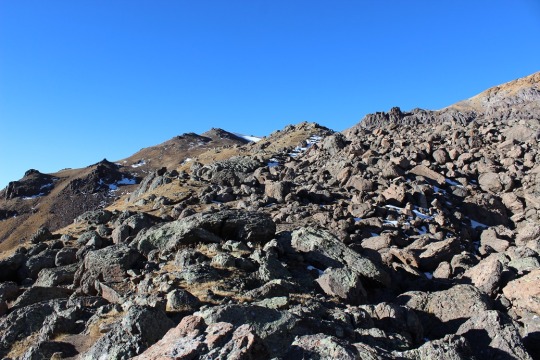
The entire trail was very well maintained, all the way to the ridge
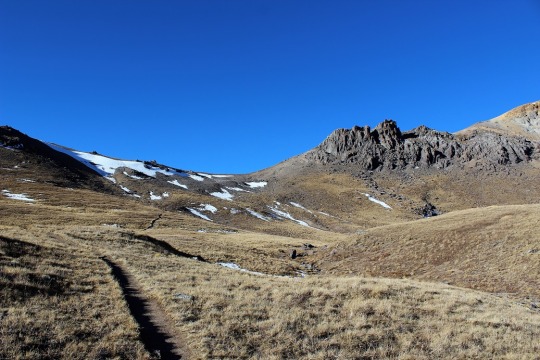
I looked for the turnoff to Matterhorn Peak but never saw it? I did see this sign, which, despite it’s name, does not go to Matterhorn Peak.
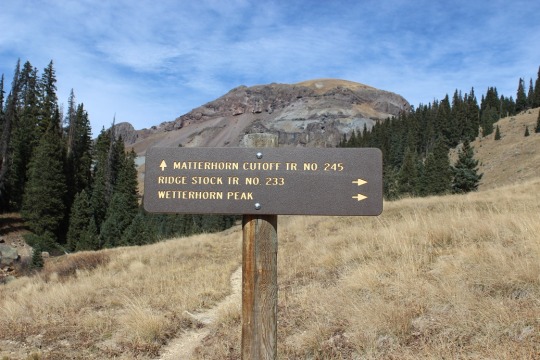
I could see a few hikers in front of me by their flashlights. They seemed far away, but I quickly caught up with them. They looked really cold in their hoodies. I was cold in my snow clothes.
At this time the sun began to rise and the temperature began to drop as I hit the ridge and the wind picked up. I still think Colorado Flag sunrises are cool!
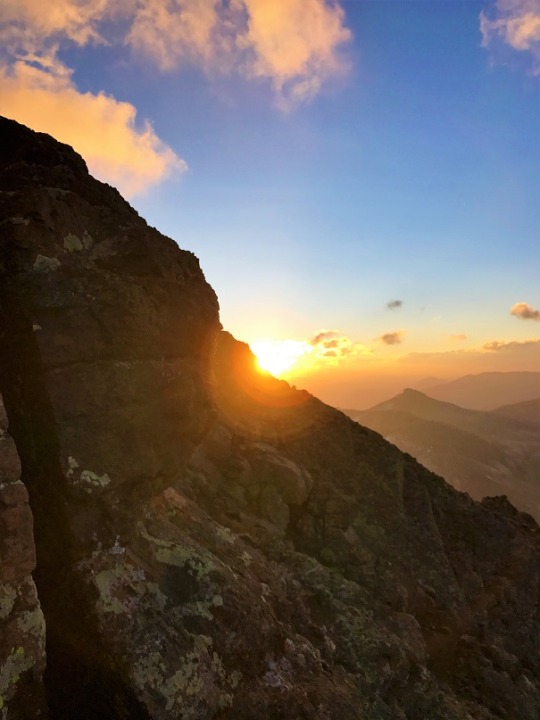
At the top of the ridge I could see most of the route left. This scree hill was insanely slippery! I could tell a lot of people had chosen to just walk on the tundra. I put on my microspikes and braved the scree.
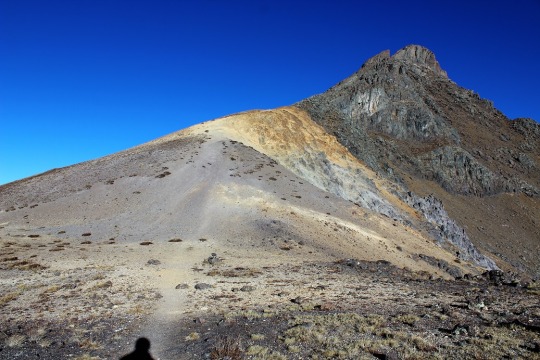
At the top of the scree hill I could see the path to the summit (or part of it).
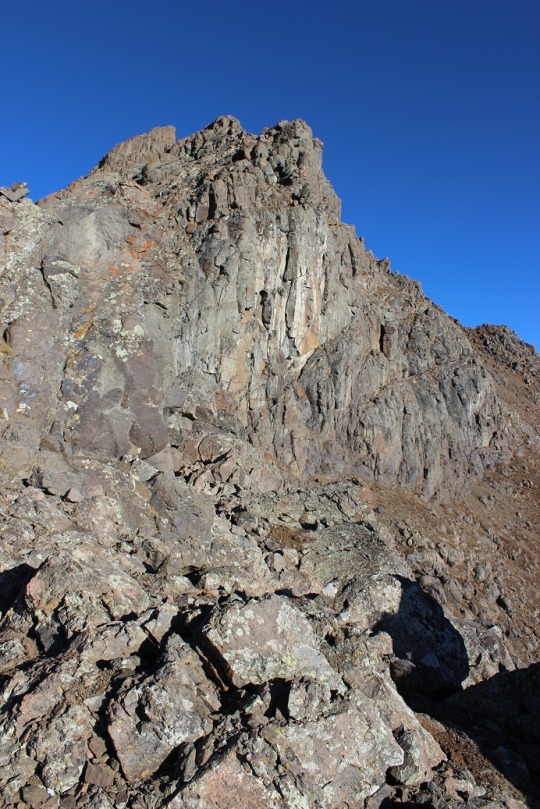
It included a LOT of scrambling over a lot of rock walls/large gullies/insanely tall boulders. These pictures just do not do them justice!
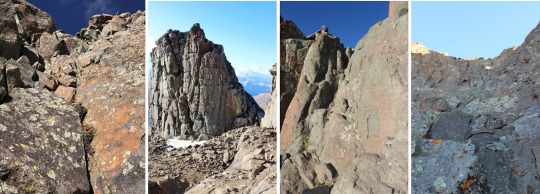
This part should have been fun for me (I love scrambling) but the weather made it really difficult to find my way. The wind was cold and intense. I had to find a cave to shelter in to get out my map, and taking my gloves off made my fingers freeze instantly. I’d look at my map, put it away, put on my gloves, head out to hike, and the terrain kept changing on me. I even brought up the pictures on my phone. Nothing up close looked like the pictures I had? Well, every once in a while they did, but not on a consistent basis. I gave up and just followed the cairns. Luckily there were a lot of them.
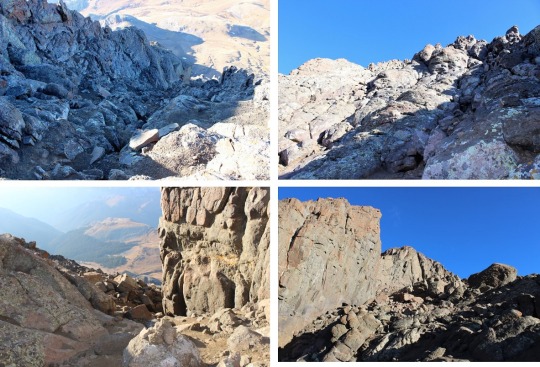
Did I mention the boulders were COLD? My hands were frozen! And it was pretty windy, so I didn’t want to rest too long to appreciate the view. I just wanted to summit, and was thrilled when I did!
I could see Matterhorn Peak and Uncompaghre Peak in the distance.
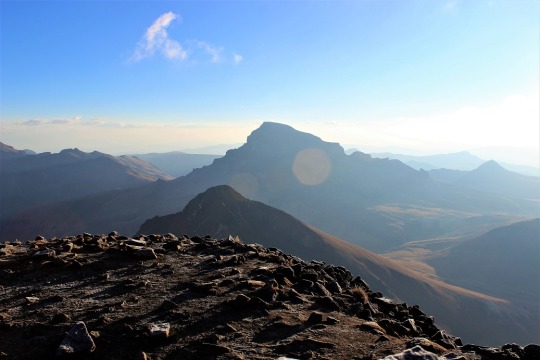
I took a selfie to prove I’d summited
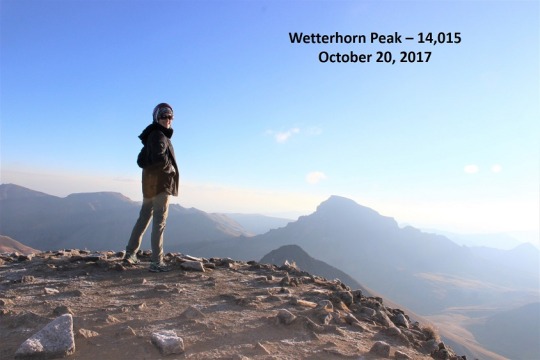
And a quick 360 degree video
youtube
And headed back down. I needed to get warm again. Soon. I was seriously worried about two fingers on my left hand at this point that were solid and starting to burn. I kept trying to flex them to keep the blood pumping but they wouldn’t move. (No, not frostbite, I have Raynaud’s, so I’m overly susceptible to cold temperatures).
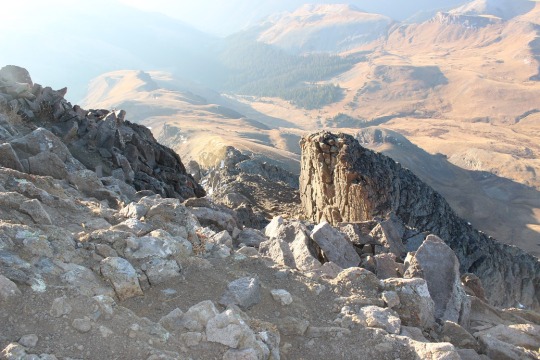
Climbing down is different than climbing up, as your center of gravity is off and you can see more of the exposure so it’s more mental. I took my time, even though my fingers were frozen. I didn’t want to slip.
Just as I was finishing the climbing part of this hike I ran into the three hikers again, getting ready to cross over the first obstacle.
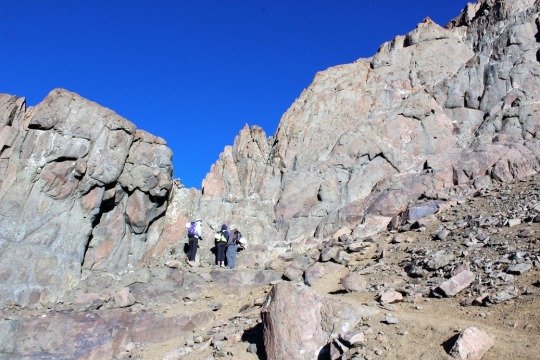
OK, time to book it back down in elevation to warm up these fingers! Luckily the sun was coming out and the clouds all seemed to gravitate towards other peaks. It was still windy though. As I hiked back down I contemplated Wetterhorn. She was beautiful!

Summiting had been really anti-climactic and I was trying to figure out why? I should have LOVED that climb! It must have been the cold/wind. I mentally tried to decide if I was even up for hiking Matterhorn Peak today? I went back and forth in my mind a few times, and told myself the decision hinged on actually finding the trailhead and my fingers defrosting. Oh, and warmer weather and less wind wouldn’t hurt…
As I descended into the basin and passed through the boulder field there was a brief period where all wind stopped. The silence was deafening. I didn’t hear a bird, marmot, pika, airplane, wind, etc. Nothing. I grew up in Southern California, and directly before and after earthquakes everything becomes still (for different reasons). That’s what this felt like: The still before the chaos. I hoped that wasn’t foreshadowing for the hike ahead.
I kept debating the whole Matterhorn Peak thing. My fingers had finally defrosted, the wind had died down a bit (but don’t let those photos fool you: the wind was intense!) and I didn’t really want to drive all the way back here to hike Matterhorn at a different time. But I was tired, and I still wasn’t sure where that trailhead was? As I was hiking I had a thought: Could it be here? At the Ridgestock Driveway and Wetterhorn Peak junction?
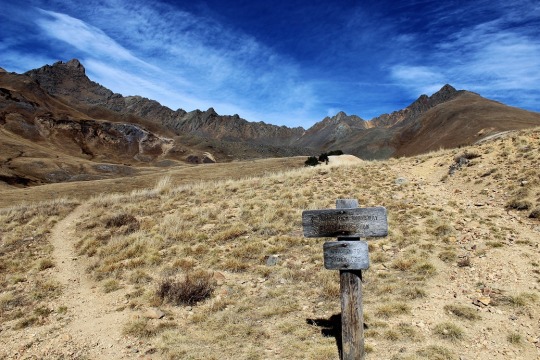
That wasn’t in any of my notes, and didn’t really make sense (shouldn’t it be at the Matterhorn trail junction where it wasn’t?). But in the daylight it looked right. I got out my altimeter. Ugh! I was at 12,500’. If I was going to do this hike I was going to have to gain another 2000’ in elevation, after already doing 3300’ this morning. I was tired. Did I REALLY want to do this? I heard my daughter’s voice in my head again: “Mom, you should just go. You’ll never really know if you can make it or not unless you try.”
Before making the decision to hike Matterhorn Peak I decided to see if this was actually the correct junction to take. Then if it was I could either continue hiking, or know for next time when I’d most likely be hiking in the dark. I started up this hill. It really did seem to go on a lot longer than it looked like it should, and more than once I thought about stopping this nonsense and heading back down the trail. But I’m stubborn, so I continued on.
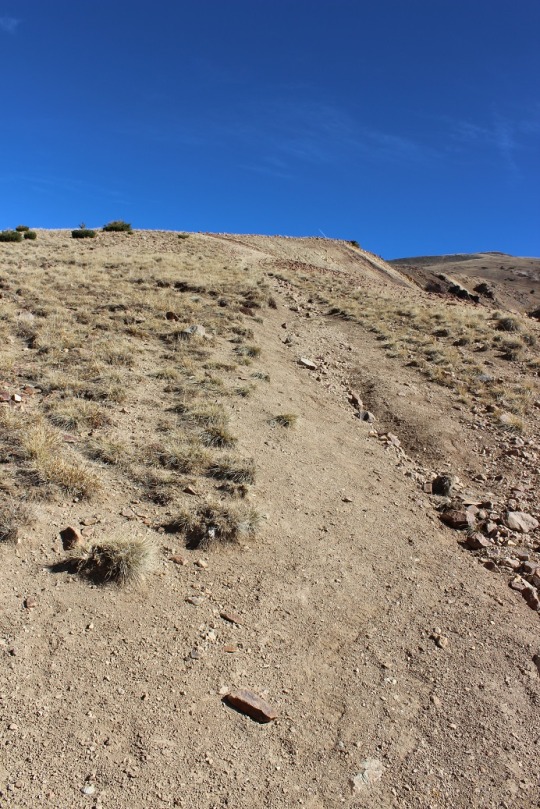
At the top of the hill the trail kind of split in two. Left is the correct way to go

This is what I saw:
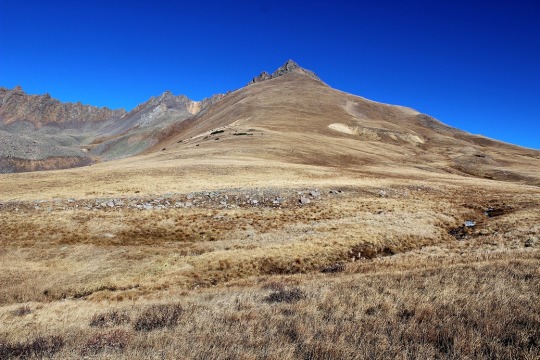
I was intrigued. What I saw before me truly looked like fun. Sure, I was tired, but this looked like FUN! There was no trail, I’d get to make a trail for the first time, and this looked totally doable! I just needed to cross the stream and head up! I was in a basin, so it would be difficult to get lost.
I was in. Since there was no established trail I designed a plan: I’d leave the trail, cross that little creek and hike straight up the mountain (no sissy switchbacks for me, I wanted that elevation gain). I looked at the entire mountain and visually picked cues (rocks) to aim towards. Here’s the route I took:
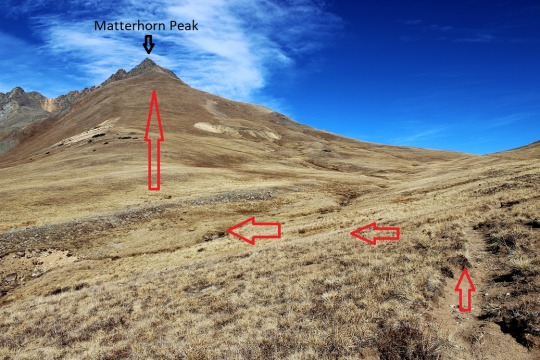
Before heading out I turned around to get a good visual of where I’d started from so I could return to the same spot. I snapped a picture with my camera just in case I forgot, and was off!
I told myself no looking back/down. The elevation gain was indeed intense because I just went straight up, but I kept making small goals and taking breaks when I met them. I took a lot more breaks than I normally do. As I got further up the mountain I could see the rocky ridge above me, and made out two figures in the center that looked to me like rabbits (think Easter Bunny Chocolate Candy). They were right in the middle of the ridge, so that’s where I aimed.

As I got closer they looked more and more like rabbits.
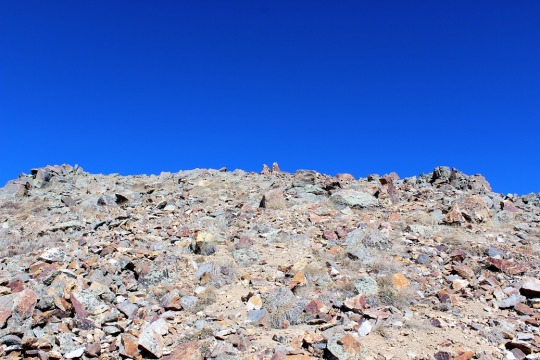
I reached the rabbits and gave them my trekking pole for safe keeping. I trudged on. I could see the summit in front of me.

There was no clear path to the top, but I could clearly see the peak and several routes I could take to summit. There was a lot of easy scrambling (compared to Wetterhorn this was a piece of cake!) and a very small summit. So small I couldn’t get a summit selfie. I straddled the summit and just sat there, thinking about what I’d just done. I’d rocked that climb! And check out my view!
youtube
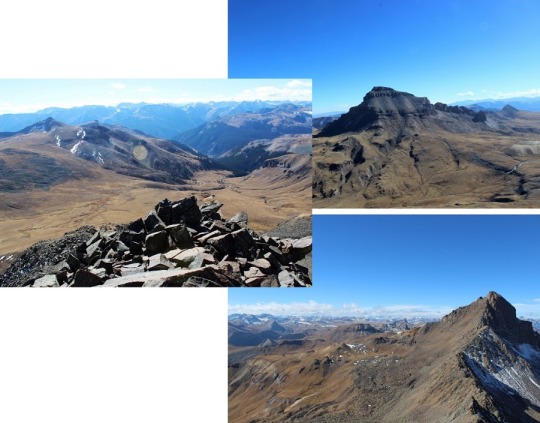
I was surrounded by Uncompaghre, Wetterhorn, and the entire mountain range. I was in the middle of it all, sitting on a peak, completely enjoying the experience. I the sun and a huge smile on my face. This was awesome! This is why I’d come to hike today! And guess what? For the 15 minutes I was on Matterhorn Peak the wind completely stopped. I was warm, could take off my gloves, and took a few pictures.
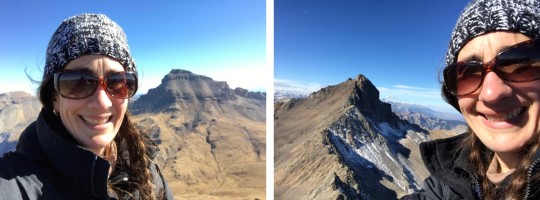
I was happy. I was thrilled. I felt accomplished and my self esteem soared. I love solo hiking!!! I spent about 15 minutes on the summit, which is unheard of from me. I usually summit, take pictures, and head back down to a lower elevation to warm up. However, it was now time to head back. I still had a 6 hour drive home ahead of me. I revisited the rabbits, thanked them for watching my pole, looked for my point of reference and headed back down the mountain.
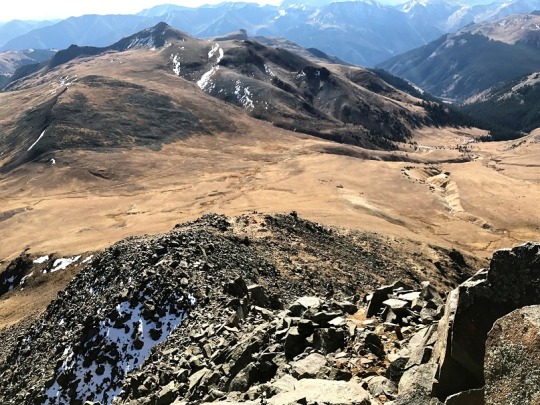
I kept looking for and finding my past reference points and headed towards where I’d initially gone off the trail. I must have done a really good job, because about three quarters of the way back I started walking over the tracks I’d initially made! How crazy is that? All those years of practicing orienteering paid off!
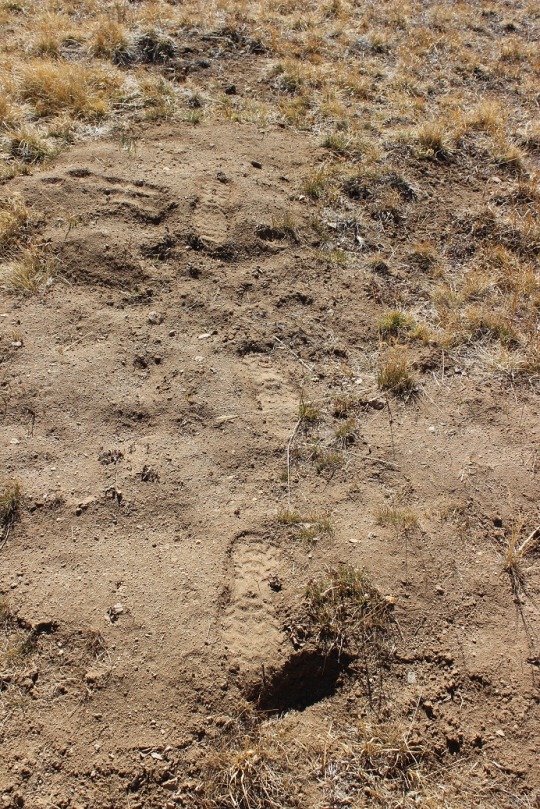
I made it back across the creek, found the trail, and headed back down the mountain. I was in a much better mood than when I’d started today! I was so glad I’d decided to come hiking. Matterhorn Peak is my new favorite 13er!
Total Miles: 10
Total Elevation Gain: 5300’
Total Time: 6 hours
#wildwanderer#14er#14erchallenge#13er#14erchallenge33#WetterhornPeak#MatterhornPeak#14015#13590#hiking#summit#climbing#colorado#sunrise
2 notes
·
View notes
Text
Why I Hike
I had someone ask me the other day who I was hiking for. The question caught me off guard, but I guess you can’t set a goal like hiking all 58 of Colorado’s 14ers and aggressively tackling that goal without people thinking you’re doing it for a cause. For those of you who don’t know me, this type of behavior is typical “Laura” behavior. If I’m going to do something, I’m going to give it 100%. Intense is a word often used to describe me. Also, if I’m not going to give it 100% I usually don’t do it at all.
No one’s noticed this yet, but I wear a different School in the Woods hat on each hike. Usually it’s the last one I knitted, but sometimes it’s just one I like. I also like the fact I’m summiting these peaks alone, and not many women hike/climb alone. I see a lot of men solo, but I’ve yet to see a woman. Why can’t women be mountaineers too? Side note: I am looking for a climbing buddy, but I really do enjoy hiking alone. Hiking is a solo activity, but climbing should be done with others.
Why do I like hiking alone?
It gives me time to think. I love to think and process information, and when I go by myself I don’t need to fill the silence with talk.
I can set the pace. I can hike as fast or as slow as I’d like. This is important because I’m usually on a schedule to get back home by a certain time to be with/pick up my kids. I have a time table that doesn’t give a lot of room for error. I rarely hike slowly, but I’d feel bad for my partner if I was slowing them down. I’m always hiking at a brisk pace that’s usually difficult for others to keep up with. I get frustrated hiking slower than necessary. Yes, hiking is competitive for me. If you’re ahead of me or behind me, we’re racing. (No, I don’t allow this to let me make reckless decisions when hiking, I know when to alter my pace for safety reasons).
I’m not a fan of taking breaks while hiking, even for drinking water or getting a snack. I continue hiking as I’m taking off my jacket or getting out my gloves. I’ve yet to meet anyone who doesn’t need a break while on a hike. This is especially important for me towards the summit, where it’s often cold. I have Raynaud’s, and if I stop/hike slowly in the cold my body shuts down and I cannot move. Frostbite comes easy to me even in warm weather (if there’s wind). I need to keep moving if I want to summit. This also means I can’t spend a lot of time on the summit enjoying the view (because I’m susceptible to frost bite I get off the summit asap, especially if it’s cold).
There are several peaks I’ve climbed I’m certain I wouldn’t have been able to summit if I’d had a partner, because they would have insisted we’d turn back. I have a higher risk acceptance rate than most because I have a lot of experience. No, this doesn’t mean I’m reckless, but I feel prepared to continue on a hike many people wouldn’t.
I’m more likely to see wild animals (because it’s quieter). Yes, this is one of the highlights of hiking for me. I get upset when I see someone with bear bells, because it means I won’t get to see any wildlife either.
I usually don’t know which peak I’m going to climb, or if I’m hiking at all, until the night before. This can be difficult for others to work with, and I’d feel bad being the one to constantly change plans. It also means I’d need to communicate with the other person about details, which isn’t something I particularly like to do (the communication part: details I’m great at).
This all probably makes me sound like an awful person, but in reality, I’m just an introvert that likes to hike solo because it’s intrinsically motivating. I understand a hiking partner would need to put up with me as well (and I admit I can be difficult). I don’t actually mind hiking with other people, but we’d need to be a good fit in areas of personality, endurance, etc. I’ve yet to find someone who is. I need to find someone with more experience to climb with next summer. There are several peaks I want to tackle that are difficult class 3’s and class 4’s where it just makes sense safety wise to climb with a partner. I need to step outside of my comfort zone, which may be more difficult for me than tackling those class 4’s alone.
Back to the purpose of this post: If people ask me who I’m hiking for I’d like to say SitW or Girl Scouts, but in reality the reason is more selfish: I’m hiking for me.
Hiking so many peaks in so little time is probably the most selfish thing I’ve ever done. I’ve always loved to hike and mountains/backpacking/camping/etc. in general, but after becoming a mom at 17 my whole world as I knew it changed. For the past 20 years I’ve been focused on being the best mom I can be, always putting my kids and their activities first. But now that two of my kids are driving/working, and all are in either High School or College, I’m noticing they have more of a social life than I do. Whenever I want to do something with them they’re busy.
I’m not mad or upset about this. It’s wonderful my kids have jobs, interests, and friends. I want to encourage them to go to work and school and spend time with their peers. But I’m finding myself with the ability to go hiking because they’re busy and I’m not. Note: I ONLY go hiking when my kids are busy, sleeping, or in school. I’ve never hiked when I’ve had an opportunity to spend time with them one on one. This is important to me, and often why I plan hikes last minute.
So, what are my goals when it comes to summiting Colorado’s 14ers? They’ve evolved over the past couple of months. Initially I’d wanted to hike them all by 2023: the 100th anniversary of the first successful summit of them all. But as I got to hiking this year I started completing them faster than anticipated. My goal for this year was to climb 11, but I’ve already made it to 29. I realize the climbs get more difficult, and I’ve done most of the “easy” ones this year, but I won’t be able to realistically hike another 29 next year. They just take too much commitment, and I know I’ll fail at a few summits the first time or two, so I’ll need to attempt them multiple times.
Realistically, my goals are to complete all 58 by the time I turn 40 (in 2020). That gives me exactly 3 more years to successfully summit 29 more peaks.
Another question I get often: Why are you hiking them all so fast? What are you going to do when you hike them all and have none left?
This question is obviously asked by someone who doesn’t know me very well. I have a lot of life goals, and this is only one of them. Off the top of my head some of the others I want to tackle are: Rim to Rim Grand Canyon, 14ers in California/Washington, Galapagos, Andes, Kilimanjaro, Mt Fuji, Mona Loa, Great White Shark Diving, the PCT and the Appalachian Trail. I also want to go back to school to get my Doctorate, I want to write a book, and don’t forget, there are over 637 13ers in Colorado, and many, many more amazing hikes to tackle!
4 notes
·
View notes
Text
#34 & #35 Challenger Point 14,081 & Kit Carson Peak 14,165

Today I wanted elevation gain. This is most likely the last change I’ll get to hike a 14er this year (I promised my mom no more hiking alone between Nov-May) so I wanted to go out with a bang. Weather was pretty stable across Colorado today, but there was a prescribed burn scheduled in the Shav/Tab area that was affecting air quality in the Colligate Peak area, so that excluded a bunch of 14ers. I couldn’t find any recent trip reports (etc. ) on Challenger Point and Kit Carson, but I’d attempted them a few weeks ago and hadn’t heard of any snow in the area since, so I decided to attempt them again, knowing if I failed (again) at least I’d get in some elevation gain.
I remembered thinking last time I hiked Willow Creek trail I’d wished I’d started at 3 or 4am, instead of 6am. It really is an early trail. So I woke up at midnight and made it to the trailhead at 4am. I’m not going to post info about the Willow Creek trail because I’ve done it before (TH and Trail info here: http://wildwandererblog.tumblr.com/post/166343409816/willow-lake).
No one had signed the trail register for days, but the last entry (10-24-2017) stated Kit Carson was socked in. I mentally prepared myself not to summit Kit Carson, but I’d take a look at it just in case (a lot could happen in 5 days!)
I was on the trail at 4:15am, and made it to the lake at 6:00am: It was still dark! Oh no! I’d hiked 4.25 miles in less than 2 hours! Lat time it took me longer, and I couldn’t help but think maybe it was due to route finding? Either that or I wanted to get a jump start on that elevation gain. In any event, I circled the lake in the dark. About halfway up the ridge I heard a loud TWANG! It startled me, as it echoed throughout the canyon. The sound was unique, but I’d heard it before when my cousins and I used to throw rocks on a frozen pond. The lake must be frozen! I bet a pretty big rock/icicle fell and hit the ice!
I continued on in the darkness, hiking slow to allow the sun to rise. Just after I passed the willows I was able to turn off my flashlight. I’d timed this perfectly! Oh, and the weather was great! MUCH BETTER than the last time I was in the area. No wind to speak of this time, but unfortunately, it looked like it had snowed recently.
Take a look at the mountain before me:

In any event, there was no wind, and I could see a lot of snow-free area, so I decided to make a go for it. I couldn’t help but think to myself, as I was halfway up Challenger Point, what a great decision it had been to hike this mountain today! The trail was pretty much free of snow, it was warm, and there wasn’t any wind. Very cool!
Unfortunately, I spoke too soon. When I’d made it about three quarters of the way up the mountain I ran into trouble. The snow up here was covering every single avenue I had to make it to the summit! I could totally see where I had to go, but the path was covered in 5-6 feet of snow and there were no footprints/tracks from pervious hikers to follow. I kept trying to find a snow-free route to make it to the ridge, but it just wasn’t happening. I had microspikes, but they were no good: I’d hike out about 8 steps or so on snow that gave me traction, then all of the sudden, ice skates. Of course I backtracked when this happened.
There were a few boulders I felt I could safely climb up and over, but I did not feel comfortable climbing back down those boulders. I need an exit strategy when I climb, and I wasn’t getting one with these rocks (so I didn’t even attempt it).
I was seriously getting frustrated, traversing in circles trying to find a safe way around these boulders/snow. Have I mentioned I hate gullies? However, I didn’t have evening plans tonight and it was a really nice day. I had plenty of time to figure this problem out. I obviously didn’t have the gear I needed for this climb (Crampons and an Ice Pick/Axe), but I really wanted to summit (safely). The snow wasn’t really that bad, I just couldn’t get traction anywhere. I looked around and thought for a bit. Most of the soft snow was by the boulders. How could I use this to my advantage?
I decided to hug the boulders, and make stairs with the soft snow at their base and around their sides. I’d be able to hold onto the grips in the rock on my way up and down, giving me stability. This took quite a bit of effort, but I needed to make sure I’d be able to climb back down after climbing up. Several times I stopped to make sure these stairs “worked” in steep areas. Success! It was slow going, but eventually I made it to the ridge! Woohoo!

I was so glad there wasn’t much wind today! The ridge wasn’t very wide, but only half covered with snow, so it was easily navigable.
I made it to Challenger Point at 9:15am. Here’s proof of summit:

And a 360 degree video.
youtube
Challenger Point was named in memory of the Challenger Space shuttle, and there’s a plaque there to commemorate it.

OK, now I looked over at Kit Carson Peak. It did indeed look like The Avenue was full of snow, but if I’ve learned anything from Mountaineering, everything looks different up close. I decided to hike over and take a look. The worse that could happen would be I’d have to come back for Kit Carson another day, but re-summit Challenger Point today (which would give me more elevation gain! Woot!).

I couldn’t take the traditional route down Challenger to Kit Carson because of that darn snow. It was really hard packed and slippery there. Luckily however, the ridge was pretty dry, so I just followed that down.

When I reached the small saddle between Challenger and Kit Carson I could see the Avenue was indeed full of snow, but navigable. And, an added plus: The snow as soft! I’d be able to get traction! I was on my way.

All I have to say about Kit Carson Peak, even with the snow, was that it was SO MUCH EASIER than Challenger Point! It was very straightforward, had lots of cairns, and was easy to follow.


I made it up Kit Carson at 10:15am. Here’s picture proof I summited

And a 360 degree view
youtube
I was fully aware at this point I was only halfway done with my hike. I now had to hike back over Challenger point and back down the mountain.

Oh, this sign says: Danger: Lose Rocks. Many people have died

Hiking back down proved a challenge, but I’m proud to say my stairs worked! A few times I needed to glissade a very short distance (less than 10 feet) to make it to a safe area, but otherwise it was a success! Very slow going, as I didn’t want to slip and fall, but a success nonetheless. The entire hike down to the basin seemed to take forever! Have I mentioned I hate gullies?


I made it back down and crossed the lake, this time in the daylight. I could see where a piece of ice had broken off in the lake, and heard another large rock drop! The lake was indeed iced over, but not completely frozen.

On the way back down to the TH I thought about how Challenger Point is a Difficult Class 2, but Kit Carson Peak is an Easy Class 3. But that was totally reversed when snow was added into the mix! Challenger Point was much, much harder for me today than Kit Carson Peak. In fact, it was the hardest 14er I’ve done so far, even though it technically shouldn’t be. It’s amazing what ice and snow will do to a climb! But I got in that elevation gain, so I’m happy!
Side note: I didn’t see anyone else on the mountain at all today? I was the only vehicle at the trailhead when I got there and when I left...

#Challengerpoint#KitCarsonPeak#14081#14165#hiking#summit#mountaineering#wildwanderer#14er#14erchallenge#14erchallenge34&35
1 note
·
View note
Text
#33 – Wetterhorn Peak 14,015 and Matterhorn Peak 13,590
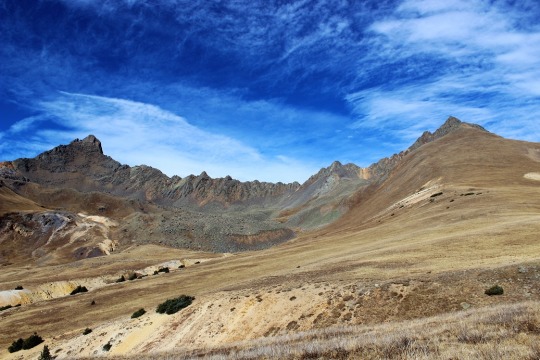
The weather today for just about every 14er in Colorado was the same: Windy. I’m not a fan of wind gusts of 45+ mph (which usually end up being around 85mph up on the peaks if we’re honest) but they’re manageable if it’s a warm day. I ruled out any peak with snow on it because wind and snow don’t mix (as I learned last week). That left me with Wetterhorn Peak for today’s 14er. I checked the weather: 20% chance of snow and 100% chance of 25mph+ winds with gusts of 43mph. Hmmmm. That didn’t sound too promising. Not bad, but not great. I knew there wasn’t any snow on Wetterhorn, so that was a plus. I was just worried it would get snow during the night/day and ruin the trip. I didn’t want to drive 6 hours out there to turn around.
I was musing all this to my kids when my youngest said “Mom, you should just go. You’ll never really know the weather or if you can make it or not unless you try.” She’s a smart 14 year old. (She must have an amazing mom…). I told her she was right, and set my alarm for midnight. Besides, this would be my 33rd 14er and my 3rd class 3. Lots of 3’s mean it’s meant to be, right?
The trailhead is easy to find/follow. From this sign it’s really a 4WD road.
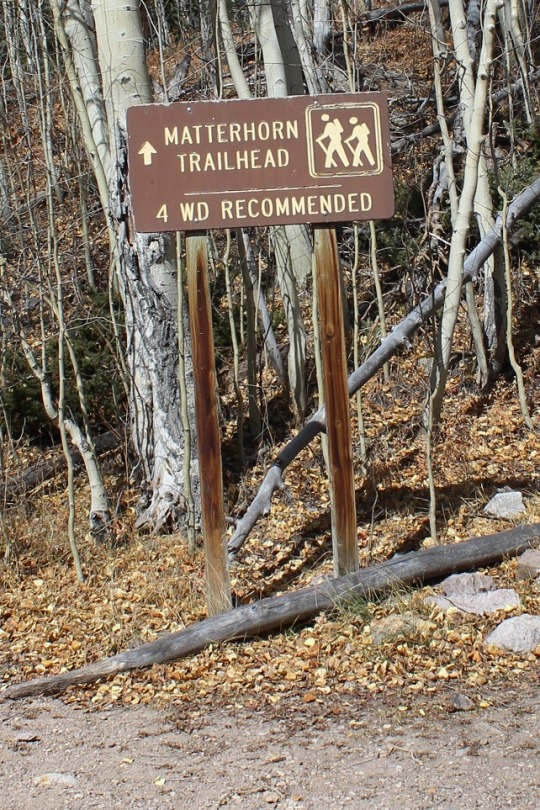
I know others have posted it’s manageable in a 2WD, and I’m sure it is for those amazing 2WD gods out there, but if you value your 2WD vehicle, do NOT take it on this road. However, if you’re looking for a reason to get a new vehicle, by all means proceed. Here are a few pics:
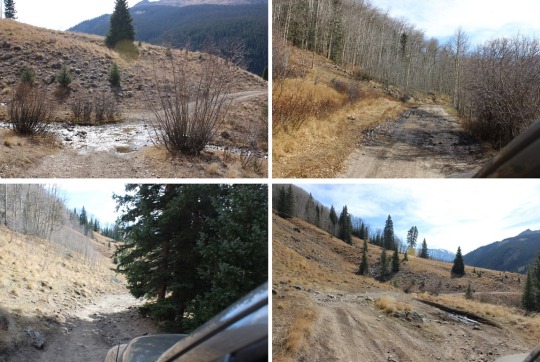
I made it to the trailhead at 5:30am and was on the trail by 5:45 (I drive fast). There were 2 other vehicles in the lot (I parked lower down). There’s probably room for 15 vehicles total at the upper trailhead, including parking about 10 yards below the lot. Here’s what the trailhead looks like in the daytime. The trail starts to the left of the trail signs.

Note: Most of these pictures were taken on the way down because my fingers were too frozen to take pictures on the way up.
The beginning of the hike was pretty uneventful. (Another Note: The summit ledger is full and the pen provided doesn’t have any ink left. Maybe a hiker could bring new supplies with them?) It was just me hiking in the dark. The trail was wide, clear of snow, with just a few muddy spots in areas. It was about 37 degrees, and there wasn’t any wind. Yet.
As soon as I hit treeline the wind began to blow, but it wasn’t too powerful and it wasn’t cold outside, so it was bearable. As the sun began to rise I noticed what looked suspiciously like snow clouds on the mountains next to where I was hiking. Luckily the wind was blowing them away from me. It seemed like the sun took an awful long time to rise this morning. I passed a boulder field that was easy to navigate but didn’t have any cairns? This could be a problem in the winter.
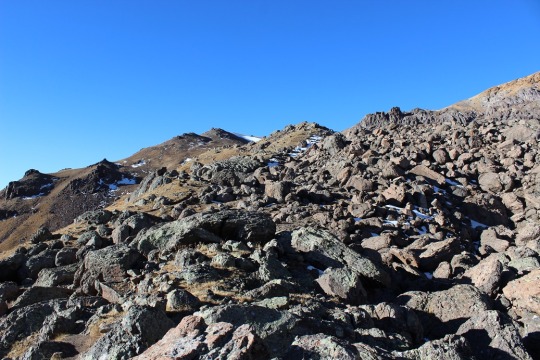
The entire trail was very well maintained, all the way to the ridge
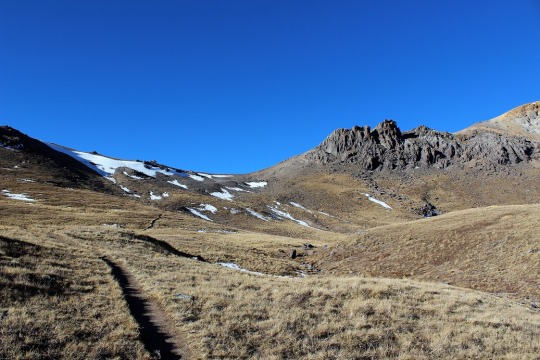
I looked for the turnoff to Matterhorn Peak but never saw it? I did see this sign, which, despite it’s name, does not go to Matterhorn Peak.

I could see a few hikers in front of me by their flashlights. They seemed far away, but I quickly caught up with them. They looked really cold in their hoodies. I was cold in my snow clothes.
At this time the sun began to rise and the temperature began to drop as I hit the ridge and the wind picked up. I still think Colorado Flag sunrises are cool!
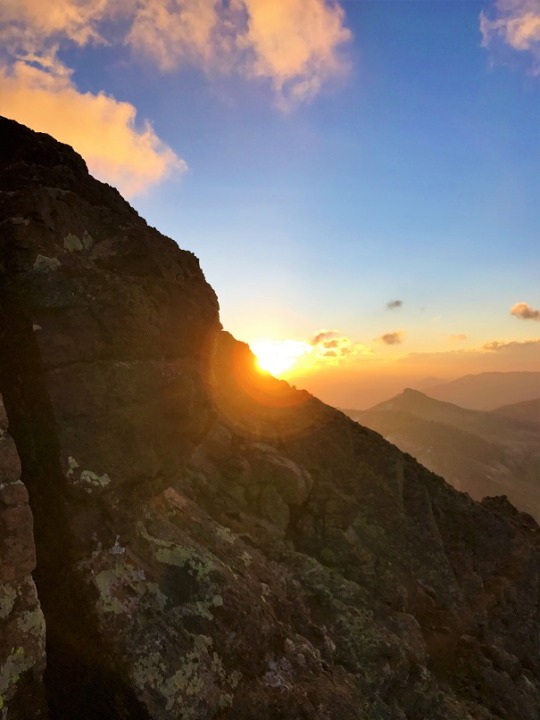
At the top of the ridge I could see most of the route left. This scree hill was insanely slippery! I could tell a lot of people had chosen to just walk on the tundra. I put on my microspikes and braved the scree.
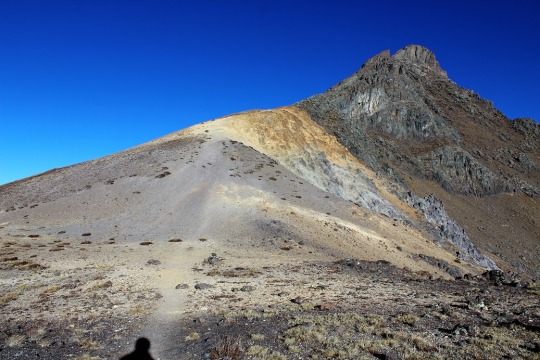
At the top of the scree hill I could see the path to the summit (or part of it).
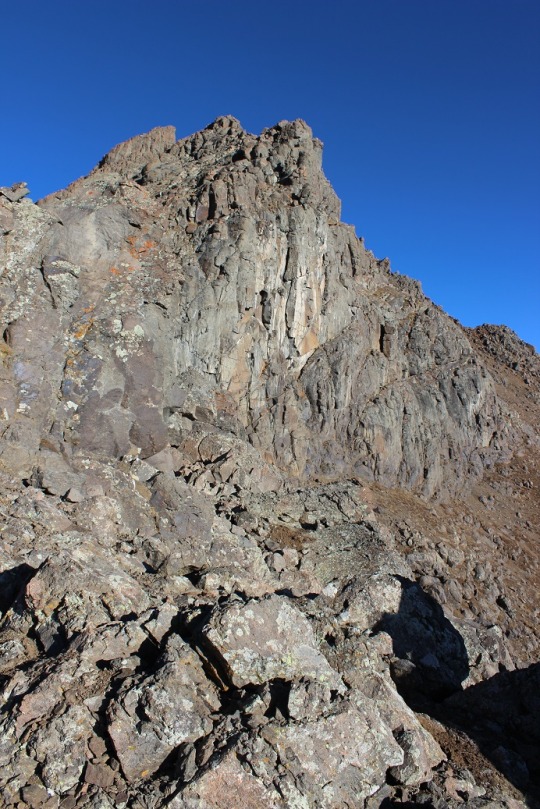
It included a LOT of scrambling over a lot of rock walls/large gullies/insanely tall boulders. These pictures just do not do them justice!
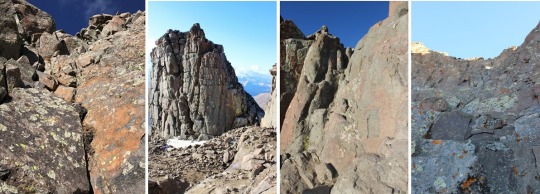
This part should have been fun for me (I love scrambling) but the weather made it really difficult to find my way. The wind was cold and intense. I had to find a cave to shelter in to get out my map, and taking my gloves off made my fingers freeze instantly. I’d look at my map, put it away, put on my gloves, head out to hike, and the terrain kept changing on me. I even brought up the pictures on my phone. Nothing up close looked like the pictures I had? Well, every once in a while they did, but not on a consistent basis. I gave up and just followed the cairns. Luckily there were a lot of them.
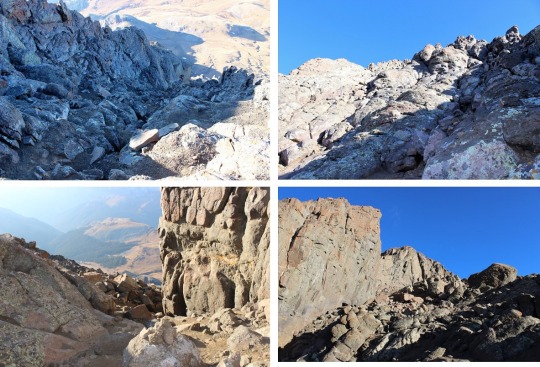
Did I mention the boulders were COLD? My hands were frozen! And it was pretty windy, so I didn’t want to rest too long to appreciate the view. I just wanted to summit, and was thrilled when I did!
I could see Matterhorn Peak and Uncompaghre Peak in the distance.
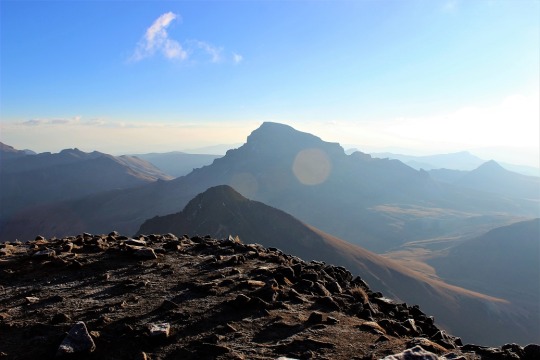
I took a selfie to prove I’d summited
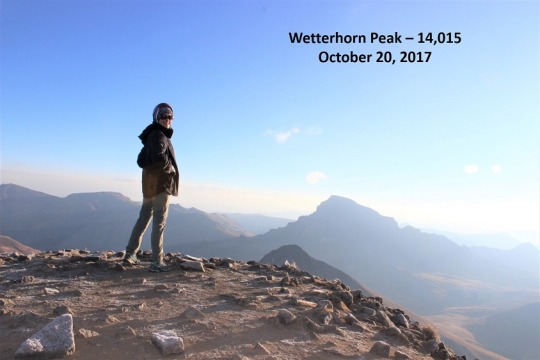
And a quick 360 degree video
youtube
And headed back down. I needed to get warm again. Soon. I was seriously worried about two fingers on my left hand at this point that were solid and starting to burn. I kept trying to flex them to keep the blood pumping but they wouldn’t move. (No, not frostbite, I have Raynaud’s, so I’m overly susceptible to cold temperatures).
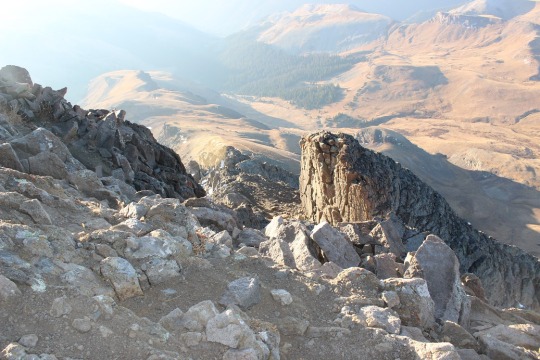
Climbing down is different than climbing up, as your center of gravity is off and you can see more of the exposure so it’s more mental. I took my time, even though my fingers were frozen. I didn’t want to slip.
Just as I was finishing the climbing part of this hike I ran into the three hikers again, getting ready to cross over the first obstacle.
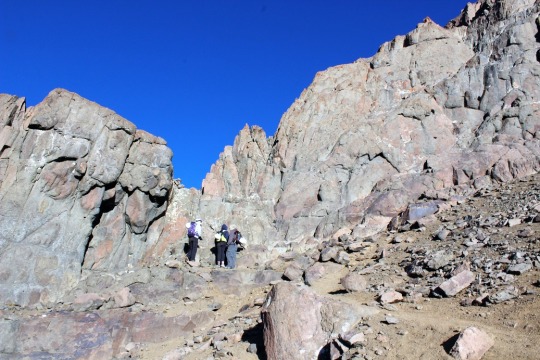
OK, time to book it back down in elevation to warm up these fingers! Luckily the sun was coming out and the clouds all seemed to gravitate towards other peaks. It was still windy though. As I hiked back down I contemplated Wetterhorn. She was beautiful!
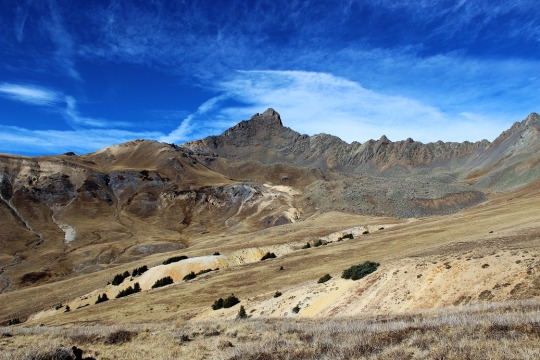
Summiting had been really anti-climactic and I was trying to figure out why? I should have LOVED that climb! It must have been the cold/wind. I mentally tried to decide if I was even up for hiking Matterhorn Peak today? I went back and forth in my mind a few times, and told myself the decision hinged on actually finding the trailhead and my fingers defrosting. Oh, and warmer weather and less wind wouldn’t hurt…
As I descended into the basin and passed through the boulder field there was a brief period where all wind stopped. The silence was deafening. I didn’t hear a bird, marmot, pika, airplane, wind, etc. Nothing. I grew up in Southern California, and directly before and after earthquakes everything becomes still (for different reasons). That’s what this felt like: The still before the chaos. I hoped that wasn’t foreshadowing for the hike ahead.
I kept debating the whole Matterhorn Peak thing. My fingers had finally defrosted, the wind had died down a bit (but don’t let those photos fool you: the wind was intense!) and I didn’t really want to drive all the way back here to hike Matterhorn at a different time. But I was tired, and I still wasn’t sure where that trailhead was? As I was hiking I had a thought: Could it be here? At the Ridgestock Driveway and Wetterhorn Peak junction?
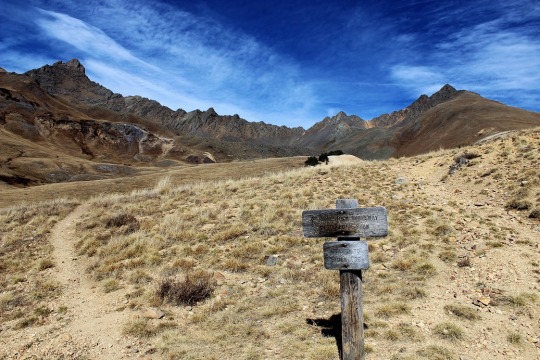
That wasn’t in any of my notes, and didn’t really make sense (shouldn’t it be at the Matterhorn trail junction where it wasn’t?). But in the daylight it looked right. I got out my altimeter. Ugh! I was at 12,500’. If I was going to do this hike I was going to have to gain another 2000’ in elevation, after already doing 3300’ this morning. I was tired. Did I REALLY want to do this? I heard my daughter’s voice in my head again: “Mom, you should just go. You’ll never really know if you can make it or not unless you try.”
Before making the decision to hike Matterhorn Peak I decided to see if this was actually the correct junction to take. Then if it was I could either continue hiking, or know for next time when I’d most likely be hiking in the dark. I started up this hill. It really did seem to go on a lot longer than it looked like it should, and more than once I thought about stopping this nonsense and heading back down the trail. But I’m stubborn, so I continued on.
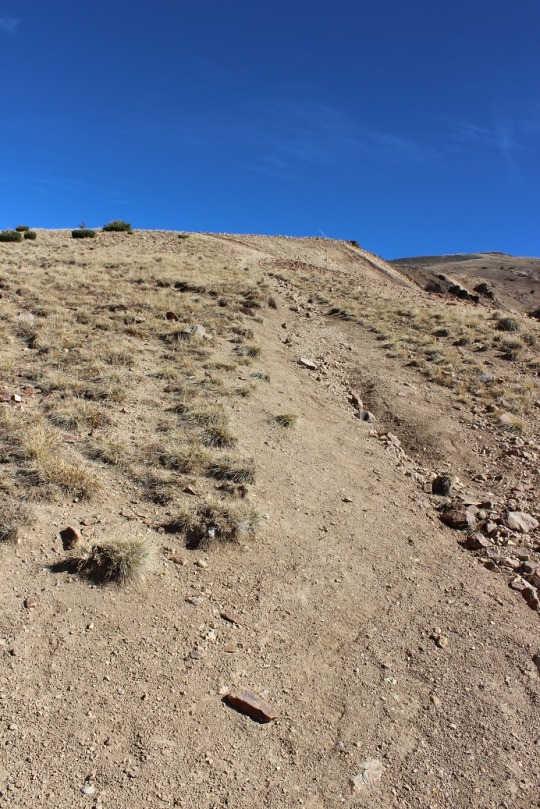
At the top of the hill the trail kind of split in two. Left is the correct way to go
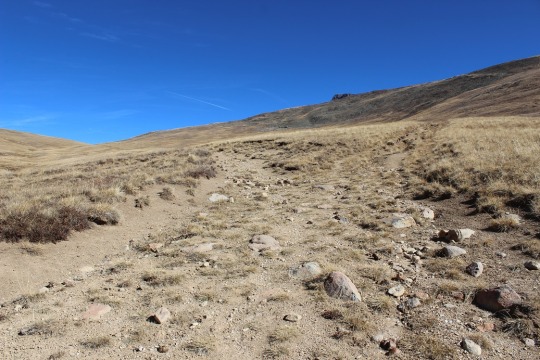
This is what I saw:
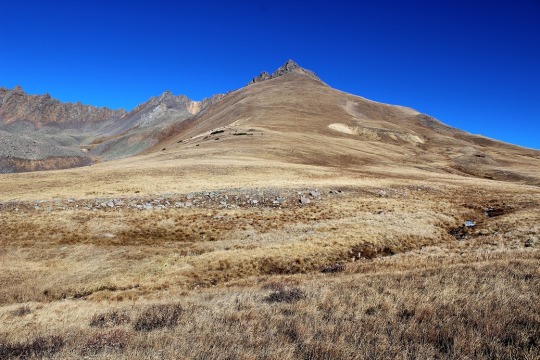
I was intrigued. What I saw before me truly looked like fun. Sure, I was tired, but this looked like FUN! There was no trail, I’d get to make a trail for the first time, and this looked totally doable! I just needed to cross the stream and head up! I was in a basin, so it would be difficult to get lost.
I was in. Since there was no established trail I designed a plan: I’d leave the trail, cross that little creek and hike straight up the mountain (no sissy switchbacks for me, I wanted that elevation gain). I looked at the entire mountain and visually picked cues (rocks) to aim towards. Here’s the route I took:
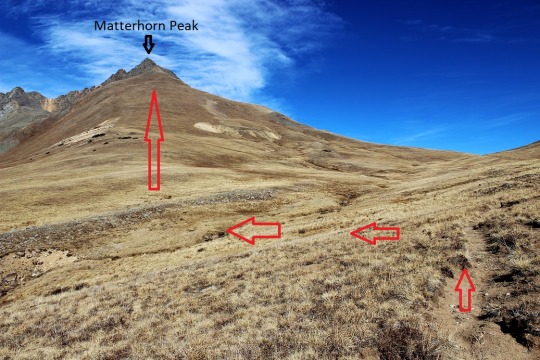
Before heading out I turned around to get a good visual of where I’d started from so I could return to the same spot. I snapped a picture with my camera just in case I forgot, and was off!
I told myself no looking back/down. The elevation gain was indeed intense because I just went straight up, but I kept making small goals and taking breaks when I met them. I took a lot more breaks than I normally do. As I got further up the mountain I could see the rocky ridge above me, and made out two figures in the center that looked to me like rabbits (think Easter Bunny Chocolate Candy). They were right in the middle of the ridge, so that’s where I aimed.
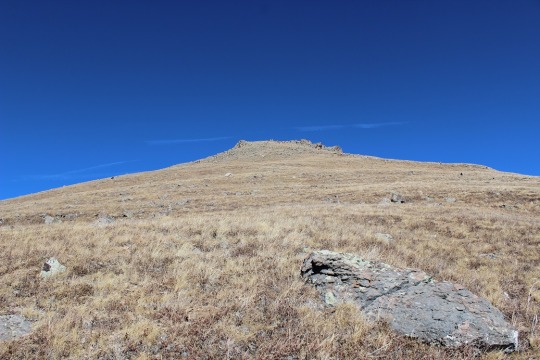
As I got closer they looked more and more like rabbits.
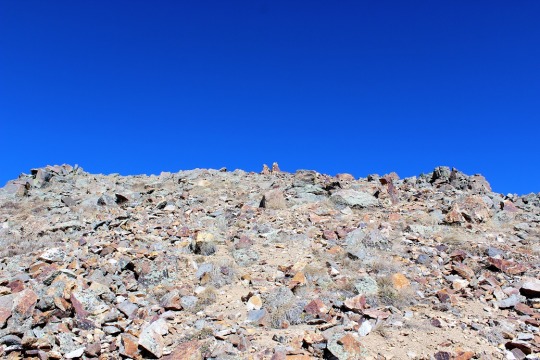
I reached the rabbits and gave them my trekking pole for safe keeping. I trudged on. I could see the summit in front of me.
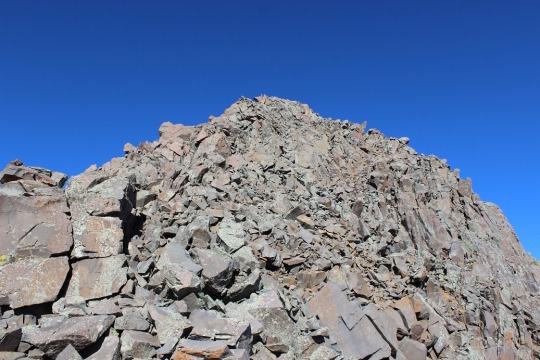
There was no clear path to the top, but I could clearly see the peak and several routes I could take to summit. There was a lot of easy scrambling (compared to Wetterhorn this was a piece of cake!) and a very small summit. So small I couldn’t get a summit selfie. I straddled the summit and just sat there, thinking about what I’d just done. I’d rocked that climb! And check out my view!
youtube
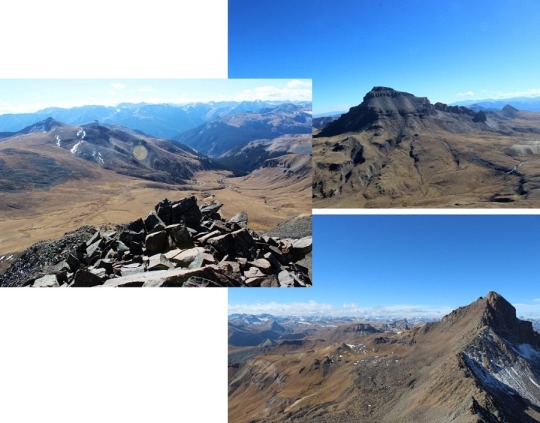
I was surrounded by Uncompaghre, Wetterhorn, and the entire mountain range. I was in the middle of it all, sitting on a peak, completely enjoying the experience. I the sun and a huge smile on my face. This was awesome! This is why I’d come to hike today! And guess what? For the 15 minutes I was on Matterhorn Peak the wind completely stopped. I was warm, could take off my gloves, and took a few pictures.
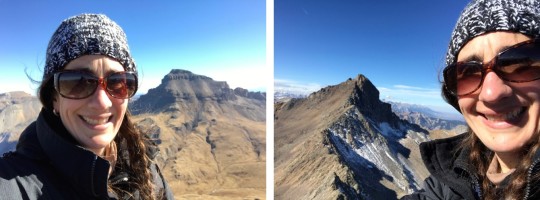
I was happy. I was thrilled. I felt accomplished and my self esteem soared. I love solo hiking!!! I spent about 15 minutes on the summit, which is unheard of from me. I usually summit, take pictures, and head back down to a lower elevation to warm up. However, it was now time to head back. I still had a 6 hour drive home ahead of me. I revisited the rabbits, thanked them for watching my pole, looked for my point of reference and headed back down the mountain.
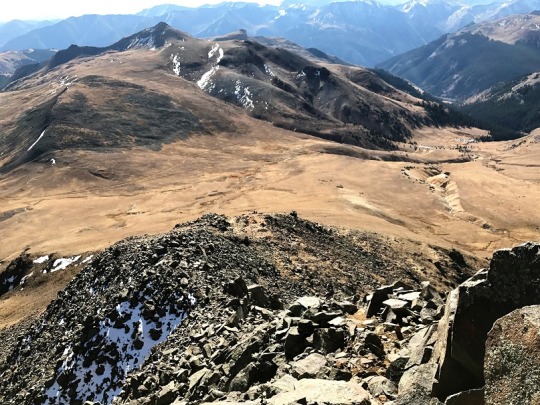
I kept looking for and finding my past reference points and headed towards where I’d initially gone off the trail. I must have done a really good job, because about three quarters of the way back I started walking over the tracks I’d initially made! How crazy is that? All those years of practicing orienteering paid off!
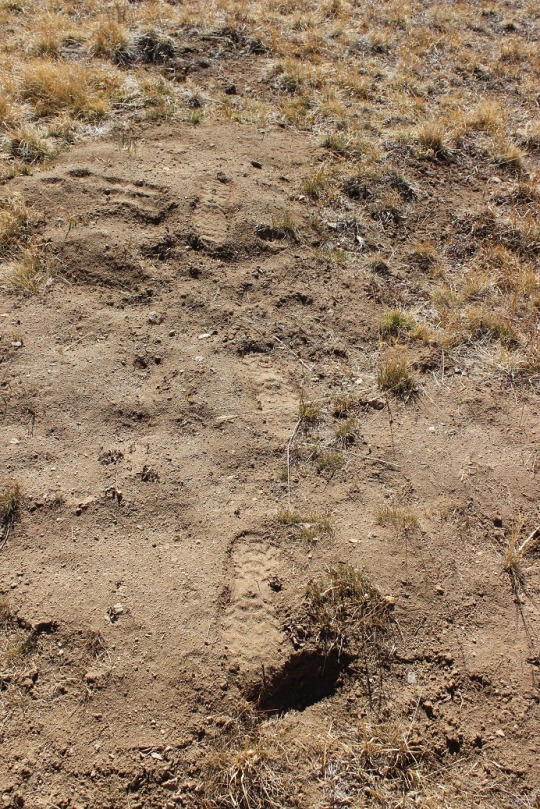
I made it back across the creek, found the trail, and headed back down the mountain. I was in a much better mood than when I’d started today! I was so glad I’d decided to come hiking. Matterhorn Peak is my new favorite 13er!
#WetterhornPeak#MatterhornPeak#14015#13590#hiking#climbing#summit#14er#14erchallenge#13er#14erchallenge33#wildwanderer#sunrise#colorado
1 note
·
View note
Text
Willow Lake

This week has been challenging 14er wise. I’m working from home all week, so basically I could’ve hiked any day I wished. I’d planned on hiking Monday, but we had a big storm roll in and blanket all of Colorado with snow. That meant I couldn’t hike Tuesday either. I made an awesome choice and hiked Uncompaghre Wednesday. I was quite pleased with myself, and wanted a similar success today. Most of the peaks I still have left to hike were too snow covered to hike this week, so I went online last night and tried once again to get information on the Crestones. The webcams made it look like they were pretty devoid of snow, but I wanted to make sure before heading out there. The forecast said it would be clear, with temperatures in the 50s with 25mph winds. The winds were higher than I’d have liked, but in the past the wind speeds have been overrated, so I didn’t pay much attention to them.
I checked my schedule for today and cleared it a bit (my son would pick up my daughter from school) and tried to get to be early. That didn’t work, but I did manage to get in 3 hours of sleep before waking up at 1am to head to the trail.
This is where my bad luck began. I’d copied and pasted the GPS coordinates into my phone, and when they pulled up they looked like what I’d printed out from my research: same mileage, cities, highways, etc. So I just followed the directions on my phone and arrived at what I’d thought was the trailhead. It was kind of weird I’d gone through a residential area, but it was on an unpaved road and we were backing up to the forest, so I figured this was the trailhead. But when I started on the “trail” (no sign, which is a pet peeve of mine) I realized I was at a water treatment plant? I pulled out my GPS and I was right where I was supposed to be, but when I zoomed in I realized I was about 15 yards off from the exact trailhead, and since I was in the middle of nowhere it would take me 20 miles to go around on the roads and park in the proper spot. I briefly considered just hiking towards the trailhead but thought better of it and drove around. The lady who’s house I’d parked in front of would appreciate I’d moved my truck from her front lawn.
This meant I’d arrived at the trailhead 30 minutes later than my intended time. I was already cutting it close (I know, I know, it’s a bad idea to put time limits on hikes, but I’m a single mom and have a lot of other responsibilities too: If I’m going to hike I have to accept these time restrictions, summit or no). 30 minutes can equal 2 miles if I book it. I seriously hoped I didn’t just endanger my ability to summit because of this stupid mistake.
The drive in was 2WD all the way.

And there was ample parking at the trailhead

Woohoo! A trail sign! I LOVE these things! This meant I was on the right trail.

I grabbed my stuff and was off at 5:30am. Right away I had difficulty. The trail obviously went to the right, but there were several social trails.

And it was dark. GPS is great, but it’s off a few feet in every direction, and I couldn’t really tell which way to go. There was a stream to the right, and I figured that was where I was supposed to go, but there didn’t seem to be a way to cross it?

In the dark (even with a great flashlight) I couldn’t see across the stream, and it didn’t look like the trees made a bridge across. I spent another 5 minutes looking at my GPS and going in circles before taking the plunge and just walking across the stream, not knowing how deep it was. My feet and legs were wet because the water was about a foot and a half deep, but there was an obvious trail when I made it to the other side.
Woot! I was on my way! The first 4.5 miles was switchbacks. Lots and lots of switchbacks. I didn’t mind much, because I was working out the elevation gain in my head and this was an easy way to get in those 4.75 miles to Willow Lake.

I crossed several smaller streams in the dark and saw numerous waterfalls. I’d be getting pictures of them later! (here they are)

Side note: water at this altitude/temperature means ice. If it looks wet, assume it’s slippery and unstable. I know this from experience.

Especially on those log “bridges”.


The last quarter mile before the lake was where the trail got rough. Well, not rough, but messy. Lots of ice and snow and mud on the trail. Yuck!


The view was great though! The only downside from this route was I wouldn’t be seeing a sunrise (it was on the other side of the mountain). It looked like I’d picked a great peak to climb today. There was minimal snow when compared with other 14ers and no clouds!

Just before reaching the lake I was watching my feet as I was hiking (ice, remember?) and I saw what looked like toes in the mud. I briefly thought it was a print from someone wearing those shoes with the individual toes, but quickly realized it was a (small) bear print! Woot! Awesome! That meant there was a bear in the area! It looked bigger than a cub print, but not big enough to be a full grown bear, and the prints were heading away from me (back where I’d came from) so we’d missed each other. Oh well, maybe I’d see it on the way down?

I pressed onward, over what looked like it was a waterfall at various points during the winter

And arrived at the lake!
It was now 7:40am. I’d hiked 4.75 miles in 2 hours 20 minutes. Uphill. Immediately the weather changed. The wind picked up dramatically, and there was no sun? The temperature dropped as I looked for the correct trail. I knew it went left behind the waterfall on the other side of the lake.

My GPS told me to go one way, but that way was now “closed for restoration” so I did my best to look for the proper trail. No dice. I ended up kind of bushwhacking my way through some willows (there had been a trail there previously that was not too overgrown) and up some rocks to where I saw a sign indicating the trail. I checked my GPS: success!
I kept trudging, admiring the view

As soon as I made my way over the waterfall area I got a good look at the Crestones: This view offered a stark contrast to their backsides! I was amazed at how much snow there was here in the middle compared to the east! No worries though, snow was easy enough to navigate.

I crossed a few very slippery half-frozen streams and made it to a large basin.

The wind was howling at this point. I looked up at the intended route and sighed inwardly: a gully. A BIG gully. I hate gullies! The first part didn’t look too bad though, and it looked like the sun was coming out?

Nope, it went right back behind the only cloud in the sky: the one very similar to the one I’d encountered on Blanca Peak last month. UGH! The weather was supposed to be sunny, clear, warm, and windy? When will I learn 14ers create their own weather? It WAS sunny, clear, warm, and windy everywhere except in the basin I was in.
Here is was cloudy, cold, and very, very windy. I rounded some large boulders and looked at the hike in front of me. Lots of snow covered the trail, with no footprints. I was probably the first to take this route since before Monday’s storm. No worries though, I liked hiking in the snow. I put on my microspikes and headed in.

I made my way to the gully. It’s actually much bigger than this picture indicates. I looked at my watch. I had exactly 2 hours to summit both peaks. In normal conditions, even with a little snow, this was doable. Today however was another story. I decided to start climbing and see how far I could make it, then adjust my goals.

The gully sucked. There wasn’t enough snow to make it easy to climb, but there was a lot of ice. And wind. Lots and lots of wind. Bitter, cold, snow-filled wind. I picked a ledge and followed it, which was much easier than hiking up the scree/snow. I gained the first ridge and looked at the rest of the route. It went to the right of the gully. Right where the wind was swirling snow into the air.

The weather kept getting worse.

The wind picked up and knocked me into the side of the mountain, hard. It pressed and held me there as ice crystals swirled up and around me and gave me an unwanted dermabrasion on the only exposed surface of my body: my face. I stood back up and got my bearings, but another gust of wind did the same thing all over again. This was not going well. I got out my map, and looked at the ‘easy’ ridge I’d get to summit after making it up the side of the gully. Ugh! It was covered in snow! (and most likely ice) And that wind! Down here it had to be at least 65+MPH. Up there? Probably worse. I did some mental calculations, and figured it wasn’t safe for me to try to cross that snow/ice covered ridge in this wind. It was knocking me around like a doll down here: I didn’t stand a chance on the exposed ridge. Maybe I could wait the weather out and see if the sun re-emerged and the wind died down? It was early yet, but how long would that take? Even now I wasn’t sure I’d be able to summit one, let alone both of the peaks I’d wanted before I had to turn back around to make it home on time, help from the sun or not. How far could I make it if the sun was out? Was it worth the wait?
Take a look at this video. See where that snow is circling to the right of the snow filled gully? That’s the route I needed to take, and then across the ridge to the left.
youtube
Then I really got to thinking. If I wasn’t going to summit today, what was I doing mentally calculating how much further I could go? Here I was, cold, on top of a gully, halfway up the side of a huge mountain, trying to gauge how much farther up I could safely climb, when I had no intention anymore of summiting. The wind was knocking me around, the ice was terrible, and my fingers were numb. The climb up the gully had been difficult and slow, and I knew from experience the hike down would be worse (center of gravity problems mixed with ice means slow going and causes slips and falls). And here I was, mentally calculating how much further I could go before I absolutely must turn back because of TIME. To make it to a class I was teaching on outdoor survival skills. Wouldn’t it be ironic if the reason I didn’t make it to the meeting was because I needed to be rescued?
Good point. I turned around and headed back. Summiting was optional, but making it down was mandatory. The gully down was indeed worse than the way up, and took me twice as long. By the time I’d made it to the bottom my fingers were turning white and I couldn’t feel them anymore (they kept gripping snow for traction, and I don’t do well in the cold). The look back was beautiful though!
I re-crossed over the waterfall and looked at Willow Lake from above

I probably should have noted the ice hanging from the waterfalls earlier. It was cold here, and had been for a few days.

There were tons of waterfalls on the way down, and lots of mud/ice to trudge through. No sign of that bear though.
Oh, but the birds were ‘singing’
youtube
What really hurt was turning back and looking on the mountain I hadn’t climbed. It looked warm and inviting on this side, yet I knew once I rounded the back it was a bitterly cold snow-globe of ice, wind, and snow. What’s worse is turning back today meant I might not get to hike another 14er this year: I don’t have many more available days so this might be it. I took a good look at all the mountain ranges on my way in. They’re socked with snow, and all are getting wind this weekend. Snow I can handle, but this kind of wind? Not fun.

It ended up being an 11 mile hike, I’m not sure about the elevation gain, but 3500’+
I’ve hiked 43 14ers and this is the first time I’ve had to turn back due to weather. And what’s worse, it was due to the wind and ice, not snow, rain, lightning, etc. Oh well, the mountain will still be there next year. I’ll try again!

1 note
·
View note
Photo

Today's climb #mtlindsey #14042 #14erchallenge #wildwanderer
2 notes
·
View notes
Photo

Today's hike #colorado #14erchallenge #mtantero #snow #summit
3 notes
·
View notes
Photo

#moonlighthike for a #sunrisesummit of #mtbierdstadt. Post to come later. Now it's on to Reach for the Peak!!! #14060 #wildwanderer #14erchallenge (at Mount Bierstadt)
4 notes
·
View notes
Text
#15 Mt. Harvard - 14,420 & #16 Mt Columbia - 14,073

If you’re reading this because you want to do the Mt. Harvard and Mt Columbia combination route my advice to you is to climb them both separately. Unless you have extensive mountaineering and route finding experience and are extremely comfortable not following a trail for miles through a gulley and over a ridge do not attempt this route.
Last week I got some good online advice from Bill. He suggested I invest in a GPS unit to help me stay on my intended route. Bill doesn’t know this about me, but I have quite a bit of mountaineering/outdoor survival experience. I teach outdoor survival skills, and I’m pretty good with a map and compass, not to mention surviving if I do become lost. (I’d like to note here I’ve never been ‘lost’. Although I have ventured off route many times I always realize this quickly and find my way back quickly).
In any event, I’m always glad to take the advice of someone with more experience than me, so I went to work researching a GPX viewer (etc.) for use with navigation. I’ve steered clear of GPS units because I like traditional route finding and feel they’re ‘cheating’, but I agree they are a useful tool. I found one I liked and downloaded the route GPX files (all 4 of them for the area even though I wasn’t taking all the hikes). The night before the hike I opened the route I was taking and it looked easy enough to use. I wanted to start getting familiar with the whole process before using it on more challenging hikes.
OK, now to the hike. The dirt road to the trailhead was easy to navigate, and navigable by any 2WD up to the actual parking lot (which was riddled with medium sized rocks in the dirt road). The road also indicated with several signs I was on the right route to the “Mt. Harvard and Mt. Columbia Trailhead”. However, once I reached the trailhead there weren’t any actual signs indicating I was in the right place. No maps, no signs saying which trailhead this was or which mountains were near. I don’t know why I expect such information, but it would be useful, especially since alpine hikers arrive in the dark (possible Eagle Scout project(s)?). Here are the photos of the information provided I took after I was done with my hike.

See, nothing that indicated Mt. Harvard or Mt. Columbia. Yes, this info should correlate to my maps, etc., but call me crazy if I like a bright sign saying I’m in the right place before venturing out into the wilderness in the dark. But I digress.
I got out my GPX file, opened it, and was confused. It placed me about 7 miles from where the trail started. I knew that couldn’t be right, so I figured I had the wrong file. Nope. I eventually figured out the file was wrong. Even though I downloaded a file that was supposed to be the route from the trailhead up to Mt Harvard, the site had uploaded the wrong file. No big deal however, as this file indicated the second half of my journey. I’d just use it when the time came and in the meantime use the maps I’d printed out. I crossed the stream in the dark and was on my way.

The trail was pretty straightforward and easy to follow for the first 5 miles or so. Besides being quite muddy in places and the fact the few turn offs I saw didn’t have signage (and I assumed went to Mt Columbia) I was able to find my way easily.

I crossed a few streams…

I saw some cool mushrooms…

And thistles…

I didn’t even pull out my map (but I had it in my pocket). I knew as long as I stayed to the left but not so far left I ran into Bear Lake I’d be fine.
Then I ran into Bear Lake. Drat! I must have turned off somewhere without seeing a turn-off.

So I turned back the way I’d come and found what I hadn’t noticed in the sunlight and mistook for water drainage had actually been a trail. It was only about 20 yards out of my way, so no big deal. Once again, no signs indicating trail forks or names.

Here’s a picture of the beginning climb to Mt. Harvard. As you can see it passes a large rocky area, but luckily it’s also a very well marked trail with lots of cairns.

Here’s a picture looking back at Bear Lake and the trail from about halfway up Mt. Harvard.

Please note here THIS is the summit of Mt. Harvard. It’s not hard to get to, but it was difficult to find as there were many false summits and this one isn’t market (there’s no way to know you’re actually at the summit). I actually passed it and had to backtrack.

I took a summit photo and got out my GPS to start on the second half of my route.

Woohoo! It showed I was exactly where I was supposed to be to make the trek from Mt. Harvard to Mt. Columbia. Awesome! Let’s see how this thing works…
Here’s a look at the trail I started following towards Mt. Columbia

And here’s a picture of Mt. Columbia from Mt. Harvard. Notice where the trail ends? That’s where it ENDS. Notice Mt. Columbia is about 1.25 miles in the distance?

I had a bunch of directions for this hike, but none of them indicated the trail ended and didn’t start again. None of them indicated the extent of the route finding I’d need. But they did have a pretty accurate description of how to navigate this hike. I followed the directions and was pretty sure I was on the right track.
I pulled out the GPS and I was right where I was supposed to be. I took out my pictures of the route and what was before me was what was in my pictures. I took out my altimeter and was shocked to find I was at 9800 feet. WHAT?!?!? I was supposed to be at 12,800! I know it had been a steep descent, but how did I lose 3000 feet in elevation that quickly (and how was I going to make it up?!?!?) About 2 seconds later I did a mental check and realized if I was at 9800 feet I’d be below treeline (which I most definitely wasn’t) so something must have been off with the altimeter. I took a deep breath and looked at the route again.

Then I looked at my watch. This was supposed to be a 15 mile hike. It was already 11:15 in the afternoon, which meant I’d been hiking for over 6 hours. I did some mental calculations and got a bit scared. I wasn’t scared I was lost or that I couldn’t get to where I was going (I could see Mt. Columbia in the distance, so I knew where I was headed, and I was confident I could get back the way I’d come). I was worried this hike was going to take a lot longer than I’d anticipated due to the route finding necessary. I had to pick my daughter up from band camp at 6pm, and at this rate I wasn’t going to make it in time. But there was really nothing I could do: Going back the way I’d come would take longer than going forward. This was something I hadn’t anticipated but will take into account on future treks.
As I was going over my options in my head I looked up and saw two guys about 500 feet in elevation above me. I waved to them and booked it up the mountainside to ask them some questions. We both had the same data.
We had to pass every single section of snow to get to where we needed to be. Since it’s August and it was in the middle of the day there was postholing involved, which wasn’t fun in the rocky areas. I have several bruises on my shins to prove it. And the icy areas were slippery. Because of this (and the scrambling aspect in many areas) I put my camera in my backpack and focused instead on the task before me, so sorry, no pictures except this before shot.

We stopped at the ridge about 600 feet in elevation below the summit for a break.
At this point I needed to keep up the pace to get home, so I said goodbye and was on my way. This part of the hike doesn’t have a trail either, but as long as you stay to the left of the ridge you’ll be fine.

Here’s a look back at Mt. Harvard (the way I’d come)

I summited and there was someone there to take my picture!

I didn’t stay long however. I opened the GPX file indicating the rest of my route and headed down the mountain. I could tell by my topo map this was going to be quite a bit of elevation loss in a very short distance. I was hoping that didn’t mean scree.

It didn’t but it wasn’t fun either. It was a lot of loose rock mixed with sand, and to combat this, switchbacks.

No, it wasn’t fun trekking down this path, but it would have been worse hiking UP this trail. Someone had a very small dog they were trying to hike with. At this point they were carrying the pooch and heading back down, as the trail was cutting up his paws.

Once I made it down Mt. Columbia the hike was easy, just long. I was doing my best to hike as fast as I could to make it back to my truck and in time to pick up my daughter. I had fun following the GPS the rest of the way but must confess it felt like cheating. It was just too easy. I’ll continue to use it though (safety first!).
I’m not averse to hiking the same trail twice (I did Pikes Peak 12 times last summer via the Barr Trail route) but I have no need to ever hike these two peaks again. Mt. Harvard wasn’t too bad, but Mt. Columbia wasn’t fun at all, and I can only imagine hiking UP the way I hiked down would have been even worse.
I made it to my truck and when I turned on directions home it said I’d be back by 6:30pm. OH no! I needed to pick up my daughter at 6pm. So I hopped in the truck and did my best to drive as quickly/efficiently/safely as possible to get there on time. I wasn’t being dangerous or erratic, but I was making good time. I showed an estimated arrival time of 6:02pm when I got behind a line of drivers stuck behind someone going 45 in a 55 in an area too dangerous to pass. Not cool! Feel free to drive at whatever speed you feel comfortable, but if you’re that far below the speed limit and you have a trail of cars behind you PULL OVER. PLEASE! You may not be in a hurry, but others might be. Me in this instance. I saw my estimated arrival time of 6:02pm go to 6:30pm, mentally cried I’d lost all the time I’d made up, and then got a call from my daughter saying they’d been let out 30 minutes early just as the radio announced the roads were a mess and to expect long delays on side streets as well as the freeway. Sigh. So I had someone else take her home and felt like a terrible mom for not being home to do it myself. Note to self: don’t plan a long hike when you have somewhere to be later in the day, even if you think you have plenty of time.
Notes:
I saw several camp groups with middle schoolers hiking/backing the trails. The ones towards the beginning of the trail were clean and had bright, happy faces. I high-fived their counselors, knowing what was in store for them in the next few miles or so. “Happy trails!”
Horses on trails: I know they’re allowed, but for the last 4 miles of my hike I saw fresh horse poop every 10 yards or so that hadn’t been there that morning. In fact, there hadn’t been ANY horse droppings on the trial at all when I’d hiked in the morning, and now it was covered in poop. I’m not exaggerating: It was all over the place! I know horse owners can’t control this, but the sides of the trail were torn up too from horses walking too close to/over/on the sides. Moss and small plants were strewn all over the trail in many areas. This is something horse owners can control and is unacceptable. I was saddened by the destruction this caused.
There was a father with his son (probably 8 years old) on the trail. They were backpacking and hiking. I saw them first at the summit of Harvard, and the kid seemed to be thoroughly loving the whole hiking experience. Rock on dad!
youtube
youtube
#wildwanderer#14erchallenge#14erchcallenge15-16#summit#colorado#hiking#mtharvard#mtcolumbia#14420#14073
5 notes
·
View notes
Photo

I climbed this today!#itseasierthanitlooks #mtantero #colorado #14erchallenge #wildwanderer
2 notes
·
View notes